Hymers Sixth Form




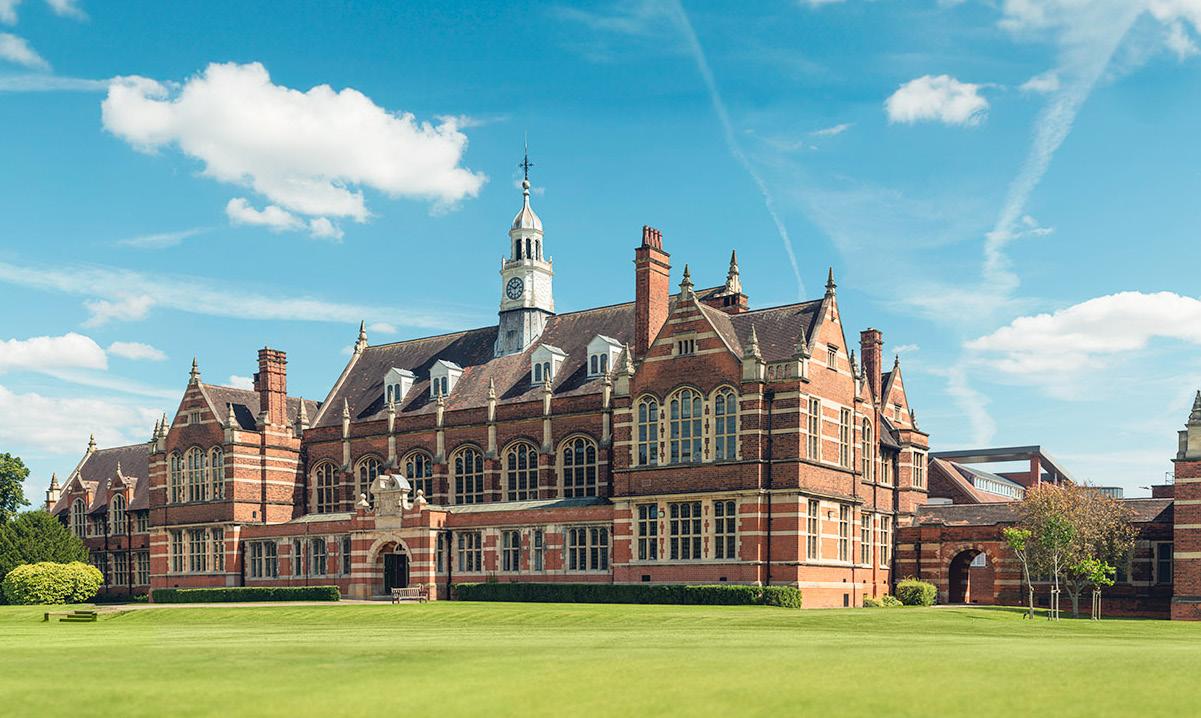
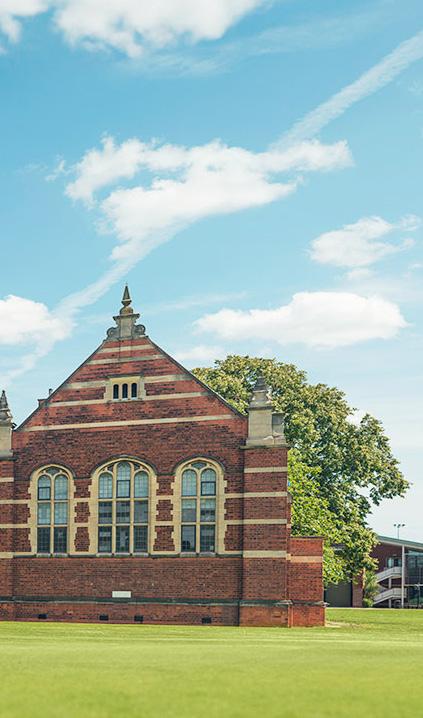
Best A Level results in the region*


Academic Excellence
Exceptional Pastoral Care
Outstanding Careers and University (UCAS) Guidance









Academic Excellence
Exceptional Pastoral Care
Outstanding Careers and University (UCAS) Guidance
Leadership and Personal Development
Support from 9,000 Alumni
100+ Co-Curricular Activities
Additional Qualifications and Enrichment
Academic Excellence
At Hymers, academic ambition is matched by support. Our students consistently achieve the highest results in the region, with teaching and curriculum time that go beyond national expectations.
• Small class sizes (average 7 in 2025–2026) enable personalised teaching
• Expert teachers with exceptional subject knowledge
• Tailored careers programmes supporting you to take your next step

Wellbeing and personal development are central to life at Hymers Sixth Form. Our pastoral care is integrated into every aspect, ensuring students feel supported, valued and ready to thrive.
• Form groups of 10-12 students, mixing Years 12 and 13 to allow for more personalised attention and UCAS references
• Personalised support and guidance
• Qualified on-site nurses supporting physical and mental health
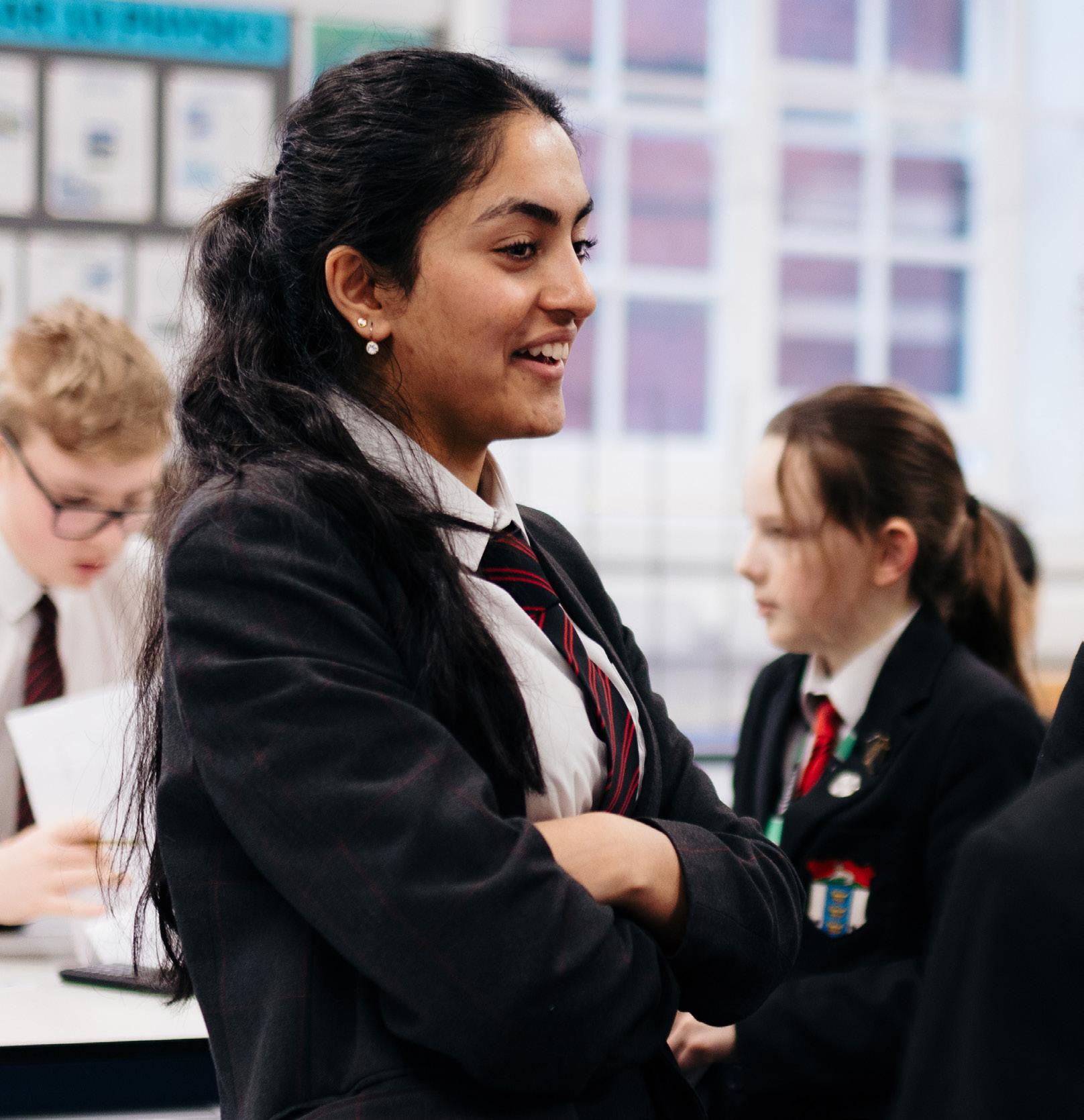

70% of the Class of 2025 gained places at elite Russell Group universities, including 10 students studying at competitive medical schools and 6 students joining Oxford and Cambridge.
Students benefit from expert guidance as they explore their next steps. Our careers programme is extensive, proactive and deeply personalised.
• Individual advice for UCAS and alternative pathways
• Dedicated Hymers Futures pathways, ensuring tailored support
• Specialist workshops on overseas universities, student finance and more
• A Careers Convention featuring over 50 local and national organisations
• University Practice Interview Evening with subject specialists and alumni
Students grow into leaders who are confident, capable and compassionate. We offer a wide range of leadership roles and the training to succeed in them.
• Form Prefects, Buddies and Academic Mentors supporting younger students
• Heads of House leading team events and upholding the House ethos
• Senior Prefects working alongside school leaders to shape student life
• Regular opportunities to develop the soft skills sought by universities and employers
Our alumni network opens doors long after students leave. With over 9,000 Old Hymerians worldwide, students benefit from a community that champions their futures.
• Work experience placements and career mentoring
• Regular visits and talks across a vast range of professions
• Lifelong networking opportunities, locally and globally
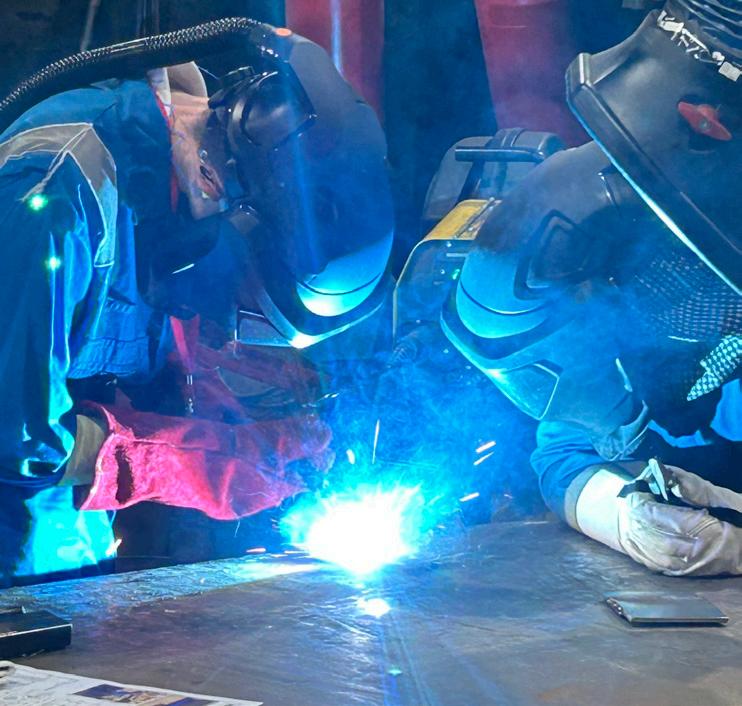

100+
Co-Curricular Clubs, Activities and Societies
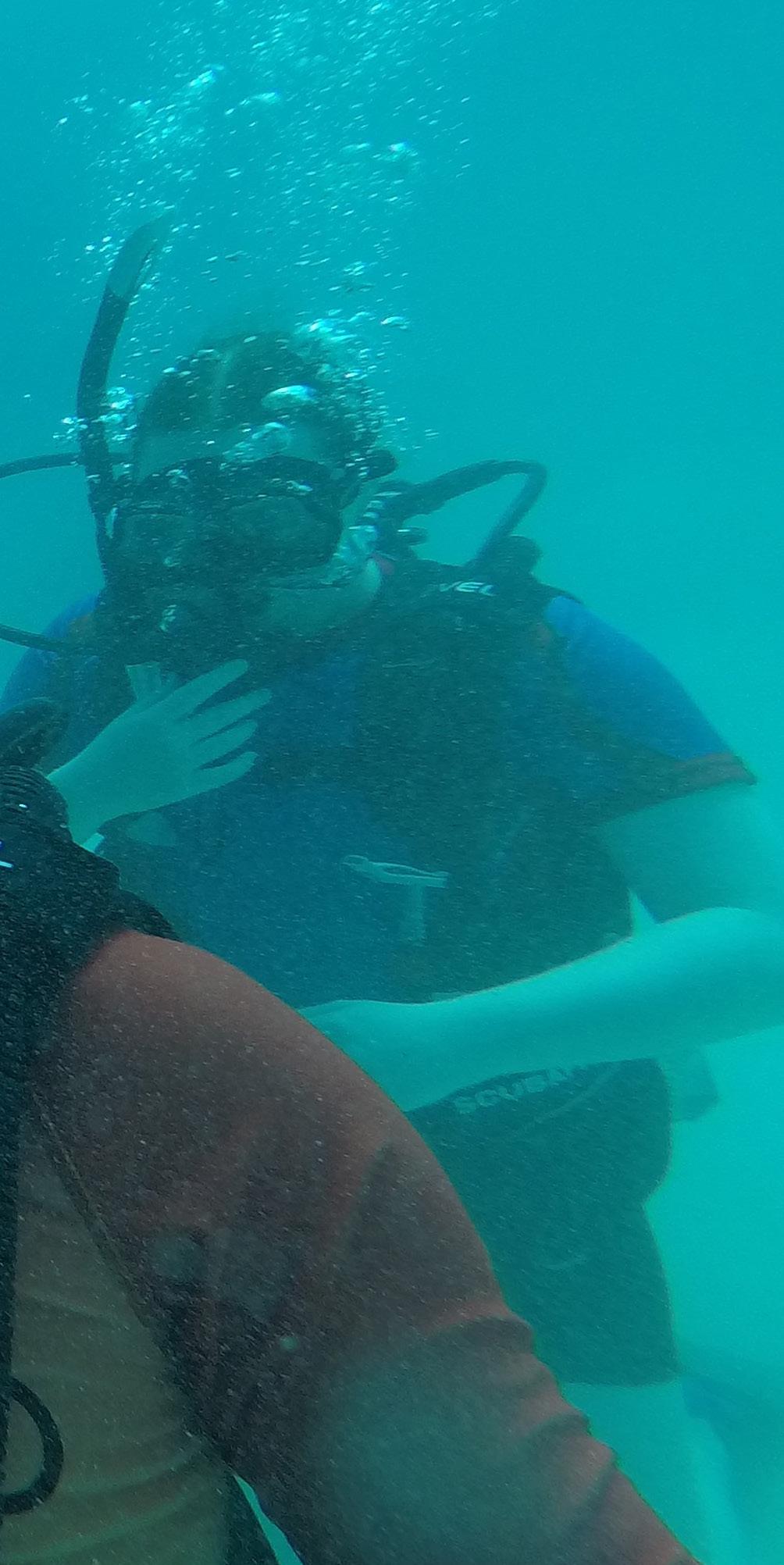
Co-curricular activities are a vital part of life at Hymers. From elite sport to student-led societies, our Sixth Formers are encouraged to explore, lead and create.
• 100+ clubs, activities and societies, from debating to drama, economics to engineering
• Expert sports coaching with full fixture programmes and national success
• Music and drama with professional-standard facilities and performances
• Duke of Edinburgh Award
We go beyond the standard Sixth Form offer. Alongside three A Levels or BTEC equivalents, students have access to additional qualifications and enrichment.
• Outstanding Hymers Futures careers pathways
• Additional qualifications, including the Extended Project Qualification
• A relevant and engaging PSHE programme, covering life skills and critical issues
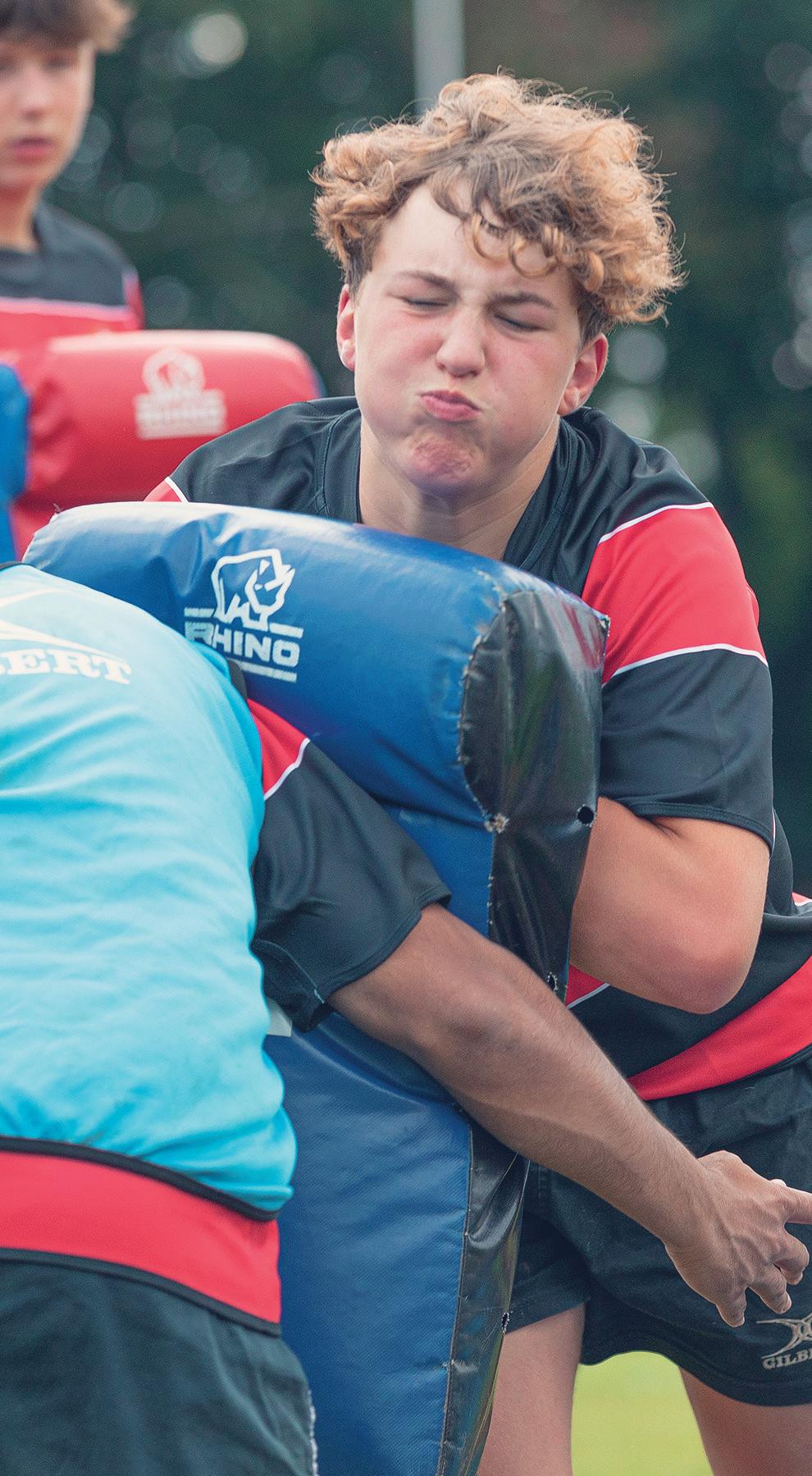

The Hymers Futures programme has been developed to expand your knowledge and skills beyond the classroom. You’ll be able to choose from one of five futures programmes:


The pathway you take will be decided by the future you wish to create.
You will evolve through your chosen pathway, building a personalised portfolio to exhibit the many skills and experiences you will gain during your time at Hymers Sixth Form. You will have access to a range of tailored opportunities, helping you to stand out in a crowd. These include:
• Tutoring to develop academic writing skills, to expand reading and for discussion of cross-curricular topics
• Individualised support and guidance for entrance tests and interviews for university/apprenticeship applications
• Dedicated supra-curriculum lecture slots, covering everything from current affairs to finance
• Supra-curricular qualifications/activities, such as British Sign Language, Sports Leadership, Teaching English as a Foreign Language (TEFL) and the Young Enterprise programme.
• Entering national and international academic competitions with support from specialist staff
• Developing public-speaking skills in regular school-wide assemblies
• Leading and attending societies
• Engaging in work experience, supported by our Work Experience Coordinator
• Mentoring younger students, both from Hymers and other schools
• Specialised Hymers Careers and Networking (CAN) events
Increase your Sixth Form learning with an Extended Project Qualification (EPQ). The EPQ is an optional independent research project equivalent to half an A Level. It gives you the chance to explore a topic you are passionate about while developing the skills universities and employers value most: research, critical thinking, academic writing, project management, and presentation. Over approximately 120 hours, you will:
• Create your own research question and plan your project
• Record your research journey
• Produce a 5,000-word essay or an artefact, such as a creative project, podcast, or programme
• Deliver a presentation to a non-specialist audience
You will be guided throughout by a Project Supervisor who supports your independent learning and helps you stay on track. The EPQ usually runs from mid-Year 12 into Year 13 and can be taken alongside your other subjects. The EPQ is highly regarded by universities, giving you valuable preparation for higher education and the opportunity to demonstrate self-motivation, organisation, and academic curiosity.
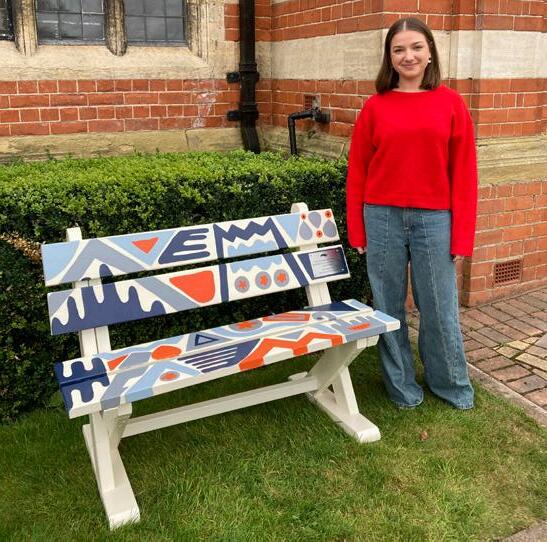
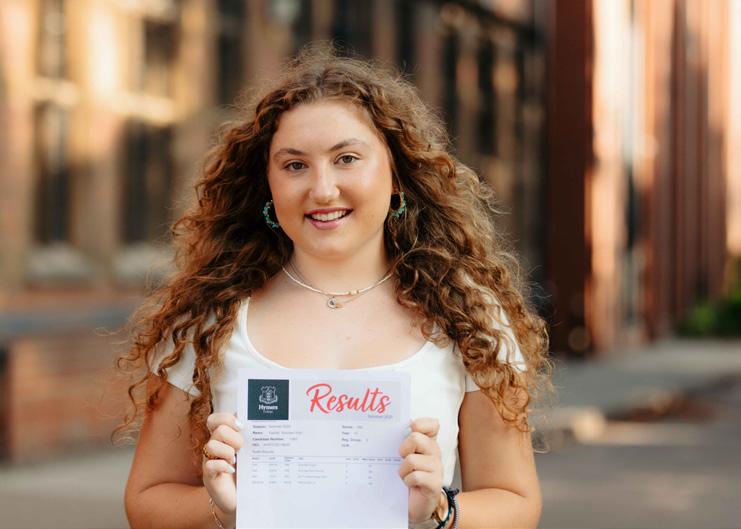
Creative Kiki heading to Loughborough to study Fine Art
Kiki celebrated an A in Politics and Bs in Art and Design and Technology. She will now take her creative talents to Loughborough University, where she will study Fine Art.
Kiki said: “I’ve really enjoyed my time at Hymers, and I’ve been involved in a lot of the extra-curricular activities.
“I’ve loved Art and Design and Technology – they’ve given me the skills I need to be successful in the real world.”
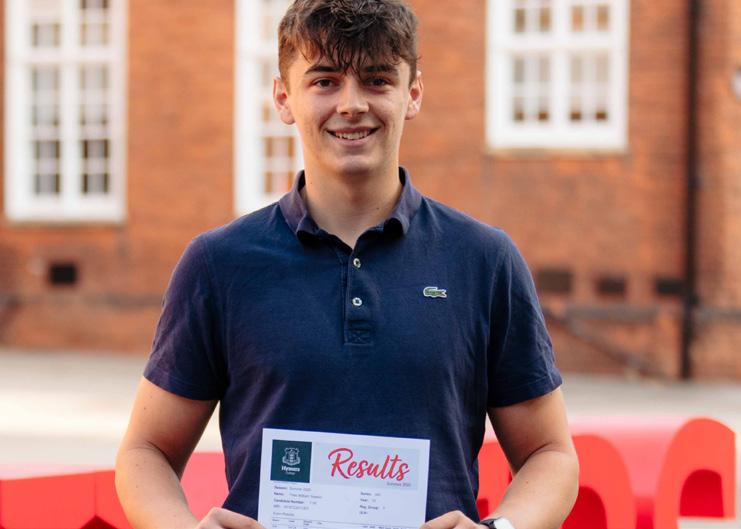
Theo celebrates Cambridge offer after making the most of life at Hymers
Theo leaves Hymers College with strong academic credentials and happy memories of a school experience shaped just as much by extra-curricular activities as classroom learning.
He achieved A* grades in Economics, Geography, Maths and for his Extended Project Qualification, as well as an A in Further Maths.
“It’s been really good at Hymers,” he said. “It’s not just been about the lessons, it’s been all the extra-curricular activities as well. There are a lot of opportunities here.
“I’ve now got an offer to go to the University of Cambridge to study Geography. I’ve got fond memories of my time at Hymers – it’s a really nice environment.”
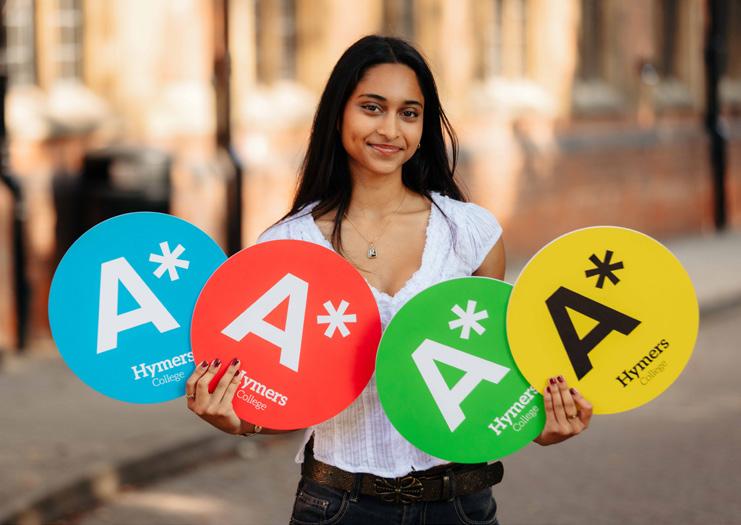
With a clean sweep of A*, Riya is one of ten Hymers students who headed to medical school in September 2025
Riya achieved A* grades in Biology, Chemistry, Maths and her Extended Project Qualification, securing her place to read Medicine at Imperial College London.
Reflecting on her time at Hymers, Riya said: “It’s been really good for me.
“I’d like to be a doctor in the future, and I think Hymers has certainly put me on the right path to achieve that.
“The staff have been really supportive, and I’ve developed some really close friends. They’ve become like family.”

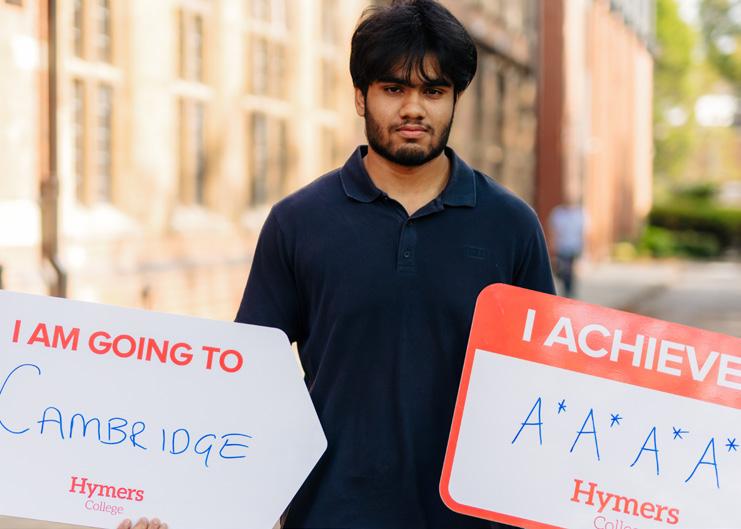
BTEC Sport student Evelyn grateful for supportive Hymers community
Evelyn celebrated a Double Distinction in BTEC Sport – a course she was among the first students to take after it was newly introduced to the curriculum.
The former Hymers hockey team captain will now begin a degree in Professional Policing at Nottingham Trent University.
Evelyn said: “I’m very, very happy with my result. I’ve always struggled with exams, so this course – being more about coursework – was the best one for me. Hymers means so much to me. I have dyslexia and they’ve been so helpful, as they have with everyone else.
“It’s a really supportive community.”
Sam secured an incredible four A* grades – in Maths, Further Maths, Chemistry and Physics.
Now, with an offer to study Computer Science at the University of Cambridge, he’s preparing to take the next step towards a career in software engineering.
Reflecting on his time at Hymers Sixth Form, Sam said: “It’s been very good here at Hymers. The teaching has been excellent, and it’s been really enjoyable.
“The staff are always there for you, encouraging you to do your best, and the other students are supportive as well.”
Whether you are continuing at Hymers after GCSEs or joining us from another school, many students find our Sixth Form to be the most rewarding and enriching part of their school journey.
Academically, you will focus on subjects you enjoy and are genuinely interested in, deepening your knowledge and developing new skills.
You’ll also notice a shift in how you work. There is no set homework timetable, instead, you will take full responsibility for managing your time and workload. You will have private study periods to help with this. Using these effectively will be essential to your success.


Most students follow a programme of three A Levels or equivalent courses.
• Each A Level or equivalent receives 5 hours and 25 minutes of teaching time per week.
• The BTEC National Diploma in Sport, equivalent to two A Levels, includes double the teaching time to reflect its breadth and depth.
Students may study Further Mathematics as their third or fourth A Level, alongside A Level Mathematics and one or two other subjects. Your academic studies are supported by a wider programme that includes tailored careers and university support, life skills, enrichment and leadership opportunities.
A Level
• Biology
• Business
• Chemistry
• Computer Science
• Design Engineering
• Drama and Theatre
• Economics
• English Language and Literature
• Fine Art
• French
• Geography
• History
• Latin
• Mathematics and Further Mathematics
• Music
• Philosophy, Religion and Ethics
• Physics
• Physical Education (PE)
• Politics
• Psychology
• Sociology
• Spanish BTEC
• Level 3 Diploma in Sport
Choosing the right subjects is an important part of your Sixth Form journey. Here are some helpful questions to ask yourself:
Do I enjoy it?
A Levels can be challenging, so enjoying the subject will make it easier to stay motivated and succeed.
Do I need it for the future?
If you have a university course, apprenticeship or career in mind, find out if it has specific entry requirements. Your subject choices may affect your future pathway.
Am I good at it?
Check whether you meet the entry requirements for the subject. If you’ve done well in the topic at GCSE, it could be a good choice for A Level or BTEC.
Still not sure?
You don’t have to decide alone. There’s plenty of support and guidance available.
• Contact our Sixth Form team by emailing sixthformteam@hymers.org.
• Speak to the Head of Department for any subject you’re unsure about. You’ll find their contact details on the subject pages.
It’s not unusual for students to change their minds during the first half term of Year 12. However, catching up on missed content is not always easy. Your initial subject choices also help us build our option blocks, so we encourage careful consideration from the start.
If you’re torn between two subjects, we recommend starting Year 12 with both. You can then make a final decision by October half term. It’s much easier to drop a subject than to pick one up later and catch up.


In 2025, Hymers students excelled across a wide range of subjects, with standout achievements including:
• 84% of Science grades at A*- B
• 82% of Maths grades A*- B
• 100% of Business grades A*- B
• 90% of Politics grades A* or A
• 86% of Computer Science grades A*- B
At Hymers, most of our Sixth Form students achieve:
• At least six GCSEs at grade 6 or above
• Grade 7 or higher in subjects they wish to study at A Level These are general guidelines rather than fixed rules. We understand that each student is unique, so we take a flexible and thoughtful approach to ensure every individual follows a programme that suits their interests, strengths and future ambitions.
Some subjects may have specific entry criteria. These are explained in the course descriptions.
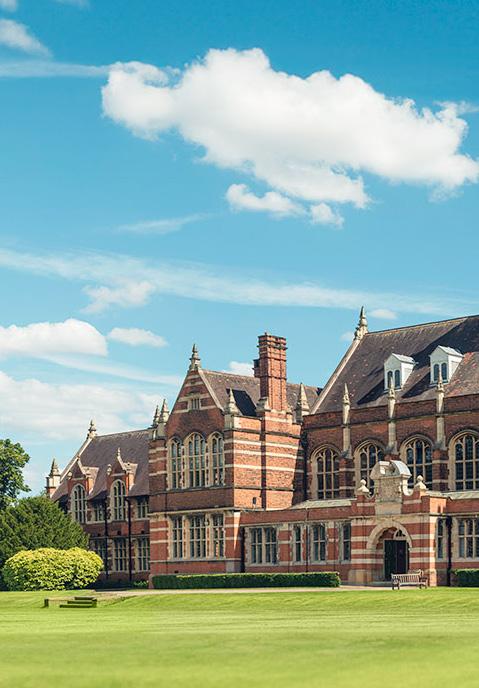
If you’re currently at another school and wish to join Hymers Sixth Form, please apply via our website, where you will also find our full application process.

If you currently study at Hymers College, our academic team will discuss your next steps through a series of careers guidance meetings.
To view our most up-to-date Sixth Form fees, please visit our website.

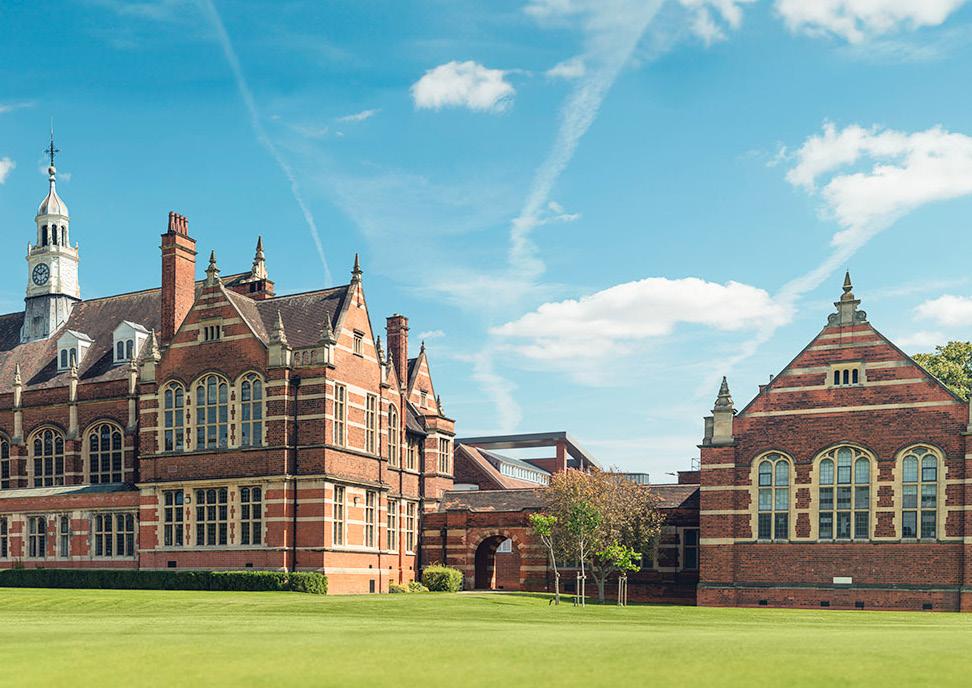
Hymers College was founded with a vision: to make high-quality education accessible to talented young people, regardless of financial background. That vision lives on through our Fee Remission (Bursary) Scheme.
Each year, over 80 students receive financial support to help cover tuition fees. Bursaries of up to 100% may be available, based on:
• Academic potential
• An independent assessment of family income and assets
If you are applying to Hymers from another school and wish to be considered for a bursary:
1. Tick the Fee Remission option on your main application form. You will then gain access to the full bursary application form via your checklist.
2. Complete and return this by the end of November.
If you are already a student at Hymers and are progressing into the Sixth Form, your family should contact our Finance Department directly to discuss available options.
Entry Requirements
Exam Board
Head of Department
Grade 7+ in GCSE Biology or GCSE Science - Double Award AQA
Mr J Hartley - jwhartley@hymers.org
Biology is all about exploring the living world — its variety, how it works, and how it develops. Few subjects offer such opportunities for discovery. Biology at Hymers will equip you with a comprehensive understanding of the core principles of this science.
You will study recent discoveries alongside long-established theories. Creativity, communication skills, practical experience and the application of the scientific method are just some of the things you will gain from this A Level.
“I chose Hymers Sixth Form because of the contact time with teachers and the smaller class sizes.
“I like the different trips that Hymers offers. I went on a Biology trip to Honduras, and I’ve also been to Swanage and Cranedale on fieldwork trips.”
Emily, Class of 2026 - Aspiring Medical Student

Course Content
1. Biological Molecules:
Explore essential molecules such as water, carbohydrates, proteins, lipids, and nucleic acids, and understand their roles in living organisms.
2. Cells:
Study the structure and function of eukaryotic and prokaryotic cells, including membranes, cell recognition, and immunity.
3. Organisms Exchanging Substances with Their Environment:
Learn about gas exchange, digestion, absorption, and mass transport in animals and plants.
4. Genetic Information, Variation and Relationships Between Organisms:
Understand DNA, genes, chromosomes, protein synthesis, genetic diversity, adaptation, classification, and biodiversity.
5. Energy Transfers in and Between Organisms:
Investigate photosynthesis, respiration, nutrient cycles, and how energy moves through ecosystems.
6. Organisms Respond to Changes in Their Internal and External Environments:
Examine survival mechanisms, the nervous system, muscles, homeostasis, and feedback systems.
7. Genetics, Populations, Evolution and Ecosystems:
Explore inheritance, population genetics, evolution, speciation, and ecosystem dynamics.
8. The Control of Gene Expression:
Study gene mutations, stem cells, epigenetics, gene technology, and their applications in medicine and research.
Paper
Content
Paper 1: 2-hour written exam
Any content from topics 1 - 4, including relevant practical skills
Paper 2: 2-hour written exam
Paper 3: 2-hour written exam
Any content from topics 5 - 8, including relevant practical skills.
Any content from topics 1 - 8, including relevant practical skills.
Studying Biology opens the door to a wide range of exciting and meaningful careers in science, healthcare and the environment. Alongside subject knowledge, you’ll develop transferable skills such as critical thinking, problem-solving, data analysis and communication — all highly valued across many industries.
If you wish to pursue a biology-related career, you may wish to explore:
Medicine | Veterinary Science | Dentistry | Nursing
Midwifery | Sports Science/Physiotherapy | Biochemistry
Agriculture | Pharmaceuticals | Environmental Science
Are you curious about how businesses operate? Are you keen to launch a corporate career? In studying A Level Business, you will explore a comprehensive range of elements required within any business in this ever-changing landscape, from human resources to marketing, e-commerce to finance.
The course will develop your critical thinking skills and give you the tools to apply business theories to real-world scenarios. You will be prepared to analyse data, evaluate business situations and make informed decisions. You will be equipped with valuable skills in problem-solving, communication, and strategic thinking.


1. What Is Business, Marketing and Finance?:
Understand why businesses exist, their objectives and ownership models, and how they make marketing and financial decisions in varying contexts.
2. Managing Operations and People:
Explore how businesses organise production, manage supply chains, ensure quality, and lead their workforce through leadership, motivation, and organisational culture.
3. Business, Society and Strategy:
Examine how businesses interact with society and their external environment, and how they develop strategy in response to challenges like technology, ethics, and stakeholder pressures.
4. Strategic Change:
Understand how businesses plan and implement strategic change, assess risk and feasibility, and evaluate the impact of strategic decisions over time.
Studying A Level Business gives you a strong foundation in decision-making, problem-solving, communication, and analytical thinking. Whether you’re aiming for a business-related degree, degree apprenticeship, or want to bring entrepreneurial thinking to any career, this course prepares you for a wide range of pathways. You may wish to explore:
Requirements
Board
Head of Department
Grade 7+ in GCSE Chemistry or GCSE Science - Double Award
AQA
Mr G Prescott - gprescott@hymers.org
Chemistry helps us understand the world around us — from the reactions that take place in living organisms to the formation of stars millions of miles away. The key ideas you’ll learn in Chemistry are essential for any scientist, regardless of their specialism. You will study through exploration and hands-on investigation. Developing practical skills is important, but so is having an inquisitive mind and strong problem-solving abilities.
At A Level, you’ll use a wide range of concepts to understand and explain why things happen the way they do.
At Hymers, many students combine Chemistry with other sciences and Maths to prepare for science-related degree programmes. Some aim to study Medicine, while others are drawn to the subject simply because they enjoy it.
1. Physical Chemistry:
Study atomic structure, bonding, energetics and reaction rates. Explore chemical equilibria, redox reactions, acids and bases, thermodynamics, and electrochemical cells.
2. Inorganic Chemistry:
Explore patterns in the periodic table, including Group 2 and Group 7 elements, Period 3 oxides and the distinctive behaviour of transition metals in solution.
3. Organic Chemistry:
Build a strong foundation through the study of alkanes, alkenes, alcohols, aromatic compounds, amines and polymers. Learn how to analyse and synthesise organic compounds using techniques like nuclear magnetic resonance spectroscopy and chromatography.


“One of the main things that prepared me for university was attending extra Chemistry club sessions and gaining lots of interview practice with Old Hymerians.”
Parul, Class of 2025
A*A*A*A*A*
Natural Sciences student at University of Cambridge
Paper 1:
2-hour written exam
Inorganic chemistry and the related physical chemistry topics, alongside relevant practical skills.
Paper 2: 2-hour written exam
Paper 3: 2-hour written exam
Any content and practical skills. Organic chemistry and the related physical chemistry topics, alongside relevant practical skills.
Chemistry is often called the “central science” because it plays a key role in linking different areas of science. It acts as a bridge between the theoretical ideas of Mathematics and Physics and the real-world applications in Biology, Medicine, and Engineering.
If you wish to pursue a chemistry-related career, areas you may wish to explore include:
Medicine | Veterinary Science | Dentistry
Nursing | Midwifery | Sports Science/Physiotherapy
Biochemistry | Agriculture | Pharmaceuticals Engineering
should also be studying A Level Mathematics
P Cook - pcook@hymers.org
Are you fascinated by how technology works and excited by the idea of creating your own software or solving complex problems?
A Level Computer Science combines practical programming with theoretical understanding, giving you the skills to analyse, design, and develop computing solutions.
You’ll explore everything from algorithms and data structures to computer systems, networking, and the social impacts of technology. This course develops logical thinking, problem-solving, and creativity — skills that are highly valued in further study and future careers.
1. Programming and Problem Solving:
Core programming concepts, systematic problem-solving, and algorithm design.
2. Data Structures and Algorithms:
Organising data efficiently and applying sorting, searching, and optimisation techniques.
3. Computer Systems and Architecture:
Hardware and software fundamentals, CPU structure, memory, and instruction sets.
4. Data Representation and Databases:
Binary systems, character encoding, data storage, and relational databases with SQL.
5. Networking and Communication:
Fundamentals of networks, data transmission, protocols, and cybersecurity.

6. Theory of Computation and Functional Programming:
Computational thinking, limits of computing, and functional programming principles.
7. Big Data and Computing Impacts:
Handling large-scale data and exploring social, ethical, legal, and environmental implications.
8. Practical Project:
Applying programming, analysis, and evaluation skills to a real-world computing problem. From a simulation of a scientific nature to creating a computer game, the world is your oyster.

Component Content
Component 1: 2 hours 30 minutes, on-screen exam
Component 2: 2 hours 30 minutes, written exam
Component 3: Non-exam assessment
and theory
Studying A Level Computer Science develops highly transferable technical and problem-solving skills, valued by universities and employers alike. It provides a strong foundation for further study or careers in technology, innovation, and analytical fields.
Potential career paths include:
Software Developer/Programmer
Systems Analyst/IT Consultant
Cybersecurity Specialist
Data Analyst/Data Scientist | Network Engineer
Artificial Intelligence/Machine Learning Engineer
Web Developer | Games Developer | IT Project Manager
Further study in Computing or STEM-related degrees
GCSE Design and Technology is not required to study the subject at A Level
Cambridge OCR
Mr D Mills - dpmills@hymers.org
Are you fascinated by how things work or how design and technology shape the world around us? If you’re a creative problem-solver who enjoys applying science and maths to real-world challenges, this course will help you become an innovative thinker, confident maker, and responsible designer.
Design Engineering blends creativity with analytical thinking. You’ll explore how products are imagined, developed, and refined — from initial sketches to engineered prototypes — while considering materials, sustainability, and emerging technologies.
Aligned with STEM pathways, this subject is ideal preparation for future study or careers in engineering, product design, or architecture.
1. Identifying Requirements:
Understanding user needs, design contexts and ergonomic considerations.
2. Learning from Existing Products:
Analysing existing designs, technologies and innovations.
3. Wider Issues and Sustainability:
Considering environmental, ethical and commercial influences on design.
4. Design Communication:
Using sketching, CAD and modelling to develop and present ideas.
5. Materials and Components:
Selecting and testing materials for performance and suitability.
6. Technical Understanding:
Exploring structures, mechanisms, electronics and smart systems.
7. Manufacturing and Production:
Investigating processes, quality control and scale of manufacture.
8. Evaluation and Viability:
Testing and refining designs against technical and stakeholder criteria.
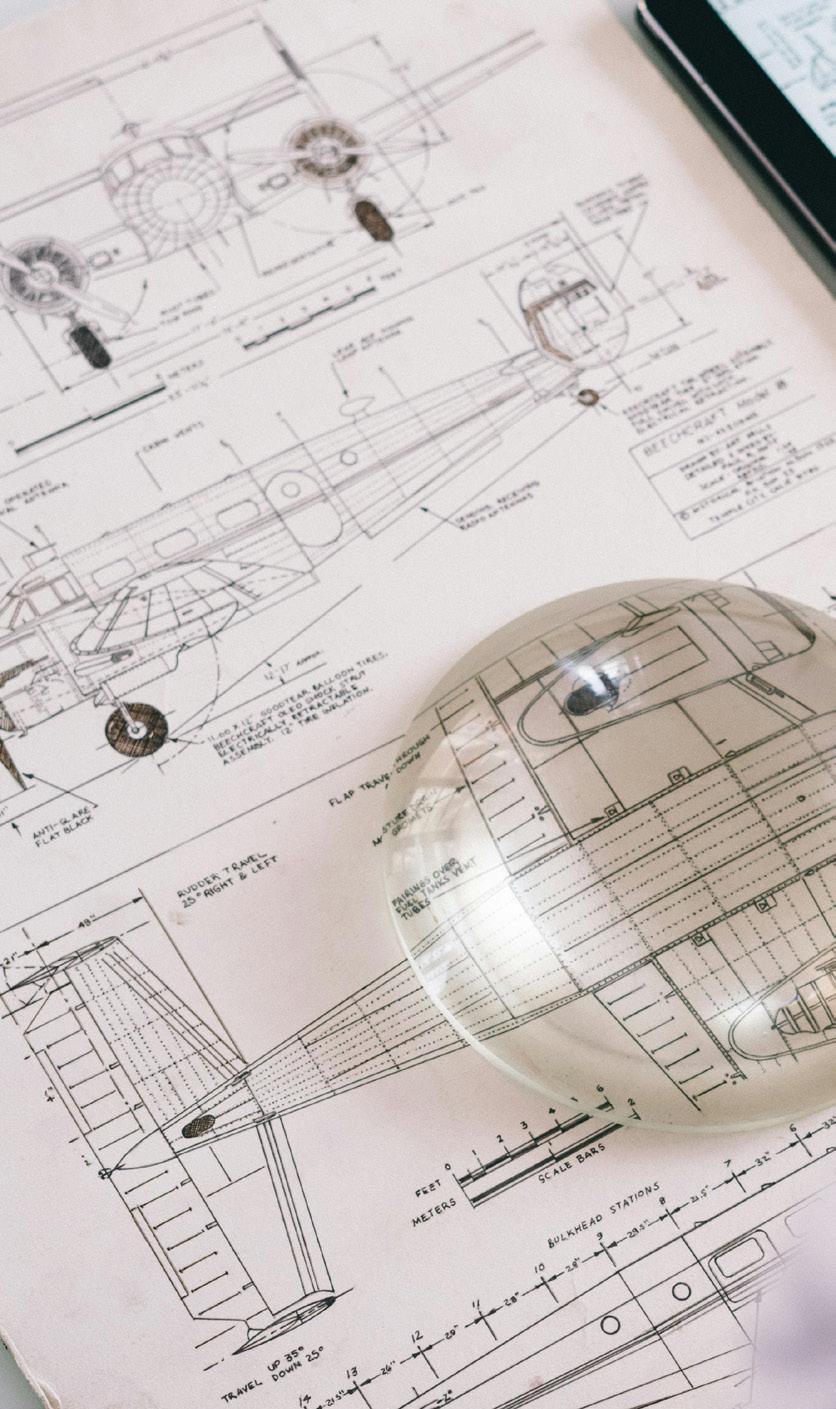
Component Content
Component 1:
1 hour 30 minutes, written exam
Component 2:
1 hour 45 minutes, written exam
Component 3: Non-examined assessment
Iterative design project - a substantial design and make project based on the context of your choice
Studying Design Engineering opens doors to a wide range of exciting opportunities. You may go on to pursue degrees and careers in:
Mechanical, Civil, and Electrical Engineering
Automotive and Aerospace Industries
Architecture and Interior Design | Product and Industrial Design
Sustainable Design and Environmental Engineering | Digital Design
UX/UI | Creative Technologies
The course also develops transferable skills such as project management, critical thinking, communication, and teamwork - essential for success in any modern career.
Entry Requirements
Exam Board
Head of Department
Drama at GCSE and/or an interest in theatre and participation in drama co-curricular activities, e.g. Youth Theatre or LAMDA examinations
AQA
Miss S Witts - sewitts@hymers.org
Do you enjoy expressing ideas and working collaboratively? Drama offers an exciting and creative opportunity to explore storytelling through performance and theatre production.
Alongside studying classic and contemporary plays, you’ll develop original work and take on various roles in production, engaging with both the artistic and technical elements of theatre.
Drama not only deepens your understanding of texts and live performance but also builds valuable transferable skills.
1. Drama and Theatre:
Develop your knowledge and understanding of drama through the study of set plays and live theatre productions.
2. Creating Original Drama:
Explore the process of creating devised drama and perform your original work.
3. Making Theatre:
Choose a specialist role for assessment and develop practical skills as a:
n Performer
n Lighting Designer
n Sound Designer
n Set Designer
n Costume Designer
n Puppet Designer
n Director

“I am now an actress and Musical Theatre performer working across film and theatre internationally. Most recently, I played Patty Simcox in the European Tour of Grease the Musical...
“My time at school helped to prepare me for the highs and lows of the industry I love.
“I learnt to play the piano and viola and enjoyed many years of singing lessons.”
Shona Mairi Masson OH 2007-2017

Assessment
Component Content
Component 1: 3-hour open-book written exam
Component 2: Working notebook (40 marks) Devised performance (20 marks)
Component 3: Performance of Extract 3 (40 marks) Reflective report (20 marks)
A Level Drama and Theatre opens doors to careers in the performing arts and complements many other fields. As well as developing performance and technical skills, your confidence and public speaking experience will lay the path for you to explore a broad range of opportunities including:
Acting | Directing | Stage Management
Law | Journalism
Public Relations | Education
numeracy and written communication skills.
Mrs N Hogg - nhogg@hymers.org
Economics explores the choices people, businesses, and governments make in a world of limited resources. You’ll investigate how markets work, why economies grow or shrink, and the impact of policies on society. The course will develop your analytical thinking, problem-solving, and research skills, while encouraging you to question, debate, and understand real-world economic issues.
1. MicroeconomicsIndividuals, Firms and Markets:
Understand how people, businesses, and markets interact. Explore why individuals make certain economic choices, how firms set prices, and what drives competition. Investigate market failures, the role of government intervention, and how income and wealth are distributed in society.
1. MacroeconomicsThe National and International Economy:
Discover how the economy functions as a whole. Study economic growth, inflation, unemployment, and the policies governments use to manage the economy. Explore global trade, financial markets, and how international factors affect national economic performance.
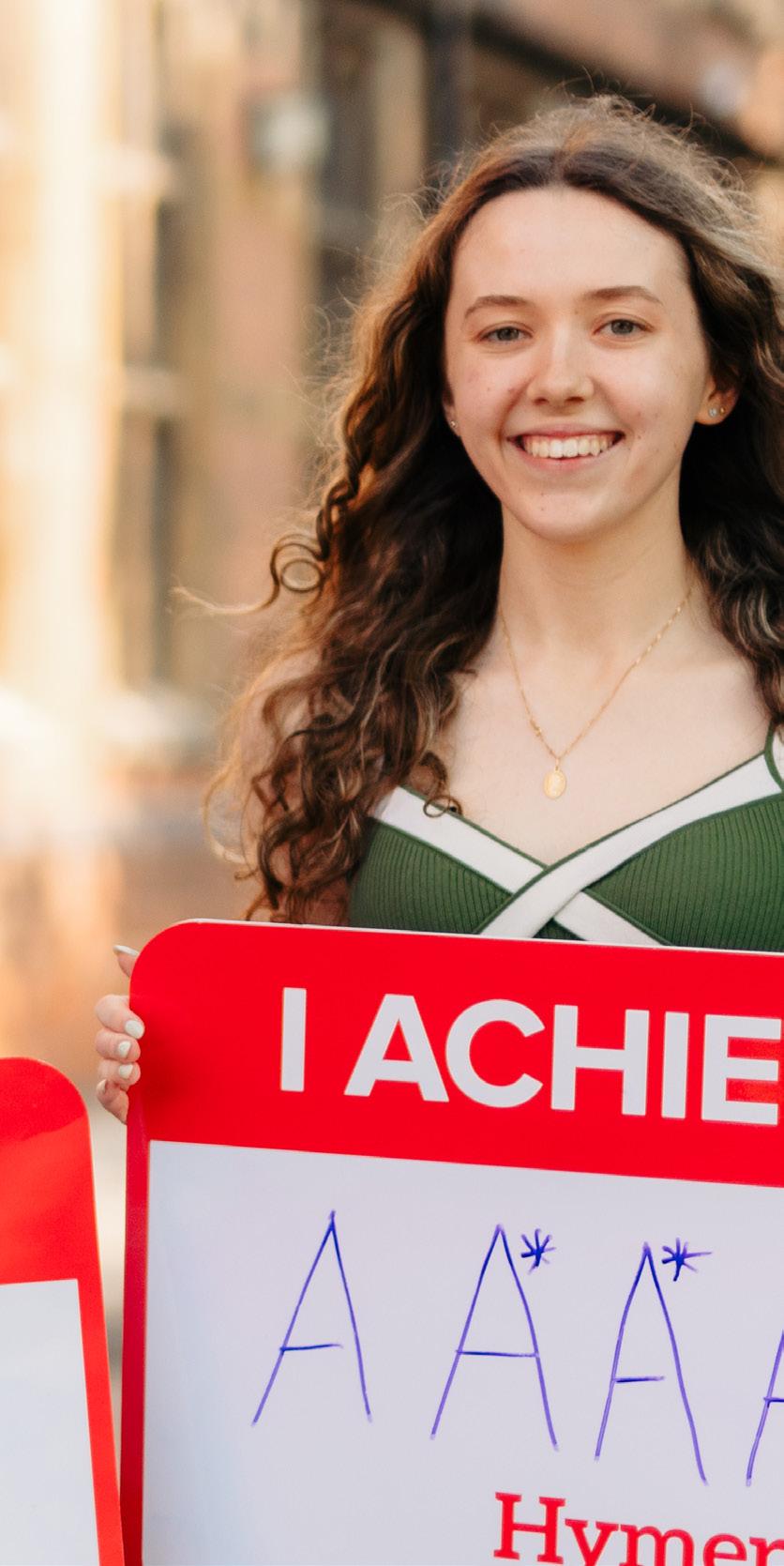

“In school, I participated in the Economics and Debating societies, which really helped me to grow my skills, which I’ll use at university and when I go into work.”
Polly, Class of 2025
A*A*A*AA
Economics student at University College London
Paper Content
Paper 1: 2-hour written exam
Individuals, firms, markets and market failure
Paper 2: 2-hour written exam
Paper 3: 2-hour written exam
Studying Economics equips you with analytical, problem-solving, and decision-making skills, opening doors to a wide range of career paths:
Law | Finance
Politics | Economics
Business and Management
Public Policy and Administration
Teaching and Academia
Ideally Grade 7+ in GCSE English Language and English Literature
T Parker - teparker@hymers.org
This course combines rigorous analysis and critical thinking across a range of literary and non-literary genres. It will encourage you to explore texts from multiple perspectives and develop strong investigative and independent study skills alongside opportunities to hone language in creative disciplines.
Beyond nurturing your love of language, it prepares you for a broad range of academic and career paths by building essential skills like linguistic evaluation, clear communication, and adaptability.
Study the ways spoken and written voices are created across literary, non-literary, and digital texts. You will develop understanding of how writers and speakers shape language to present identity or persona, explore connections between texts, and consider the significance and influence of context.
Explore different writers and the methods they use to express their thoughts and ideas on a theme through both literary and non-fiction writing. Develop your understanding of the literary devices writers use to craft their work and communicate ideas or issues. You will work towards making perceptive connections between texts and consider how real-world contexts influence their meaning and impact.

Hone your skills as a writer by crafting original fiction and non-fiction texts. You will explore various writing forms and how writers use linguistic and literary techniques, you’ll develop new knowledge and understanding needed to create your own unique pieces. In Year 13 you will have opportunity to choose your own texts, pursuing and investigating themes and genres that inspire you.
Assessment
Component Content
Component 1:
2 hours 30 minutes, written exam
Component 2:
2 hours 30 minutes, written exam
Study of 20th and 21st Century texts with a focus on ‘voice’.
Study of A Streetcar Named Desire by Tennessee Williams
Study of two core literary texts, currently The Great Gatsby by F Scott Fitzgerald, and Shakespeare’s Othello
Component 3: Coursework
Create a non-fiction and a fiction text of your choosing alongside an analytical commentary
“The course has given me critical, analytical and comparative skills that will be useful in higher education. I enjoy the variety of texts we study and the freedom to explore my own style and creative interests.”
Amelie C
Current Year 13
An A Level in English Language and Literature is highly valued for many degree courses and careers. The skills you gain — critical thinking, effective communication, creativity, and research — open doors across numerous industries, including but not exclusive to:
Law | Marketing | Journalism | Publishing
Teaching and Education | Performing Arts
Travel and Tourism | Graphic Design
Health and Social Care
GCSE Art is not required to study the subject at A Level
Mr D Whittaker - dgwhittaker@hymers.org
A Level Fine Art at Hymers is a dynamic and immersive creative journey. You will be encouraged to explore a wide range of media and techniques, from traditional drawing and painting to experimental mixed media, digital manipulation, and moving image. Working in two and three dimensions, you’ll push creative boundaries and refine your visual language.
You’ll use tools like Adobe Creative Suite and graphics tablets to enhance your digital skills, while also developing hands-on techniques in collage, mixed media, and more. You’ll be guided to create personal and meaningful work, with an emphasis on developing a distinctive, technically accomplished style that reflects your artistic interests.
You’ll be encouraged to push your ideas, reflect critically on your progress, and produce bold, original work.
Content
1. Recording and Responding:
Experiment with different ways of recording and responding, from observation and analysis to imaginative and expressive approaches.
2. Creative Purpose and Audience:
Learn how to create artwork with a clear sense of purpose and audience.
3. Genre Exploration:
Explore a variety of genres, including figurative and abstract work.
4. Practical Skills Development:
Develop practical skills using a wide range of materials and methods, such as painting techniques like underpainting and glazing, sculptural processes like casting and assembling, and printmaking techniques including etching and lino printing.


5. Composition and Structure:
Understand how to use composition, rhythm, scale and structure effectively in your work.
6. Visual Elements:
Strengthen your use of key visual elements — colour, line, tone, texture, shape and form.
Component Content
Component 1: Personal Investigation
Working from ideas developed in Year 12, this student investigation is a coherent, in-depth study that includes supporting work, final outcomes and a written analysis of 1,000 to 3,000 words
Component 2: Externally Set Assignment 15 hours, externally set assignment
Studying Fine Art builds a powerful set of transferable skills that are in high demand across a wide range of industries; including creativity, independence, problem-solving and self-motivation are just some of the qualities you’ll develop.
If you wish to pursue a creative career, industries you may wish to explore include:
Architecture
Illustration
Photography
Marketing Design: Fashion, Graphics, Games, Interiors, Product, Industrial
Theatre and Media Production Culture and Heritage
In today’s interconnected world, speaking multiple languages opens the door to a world of opportunities, boosting your career prospects both in the UK and internationally. Learning another language not only sharpens your mind but also expands your horizons, personally, culturally, and professionally.
You’ll engage with authentic French materials, films, articles, literature, and more, while exploring the modern society, culture, and heritage of French-speaking countries. The course encourages a deeper understanding of global issues, including ethical, environmental, health, and European topics, helping you become a more informed and thoughtful global citizen.
A Level French is not just a subject, it’s a powerful advantage in today’s competitive world.
1. Changes in French Society:
Explore family life, the education system, and the world of work, including attitudes to gender equality and the right to strike.
2. Political and Artistic Culture:
Study the impact of music, media, and festivals on French-speaking societies.
3. Immigration and Multiculturalism:
Examine the benefits of immigration, the challenges of integration, and the rise of the far-right.
4. Occupation and Resistance:
Investigate France under Nazi occupation, the Vichy regime, and the role of resistance leaders and citizens.


Component Content
Component 1:
Listening and 2-hour written exam
Component 2:
2 hours 40 minutes, written exam
Component 3: Speaking
Percentage of Marks
Listening, reading and translation
A 15-minute conversation between teacher and student Written response to written works and translation
Whether you pursue language-focused roles or apply your skills in other sectors, French can give you a competitive edge in the job market and open opportunities in the UK and abroad.
You may wish to explore careers in:
Language teaching
Translation and interpreting | Linguistics
International business and marketing
Tourism and hospitality
Diplomacy and international relations
Publishing and media
Law and legal services | Finance and banking
Entry Requirements
Exam Board
Head of Department
Grade 6+ in GCSE Georgraphy is essential
Miss N Batch - njbatch@hymers.org
Geography is the study of the world around us — its landscapes, environments, and the interactions between people and places. A Level Geography encourages you to think critically about contemporary issues such as climate change, migration, and sustainability.
Through a blend of physical and human geography, you’ll develop practical fieldwork skills and engage with real-world data, preparing you to understand and address the challenges of the 21st century.
1. Physical Systems:
Explore the processes shaping landscapes and environments, alongside the water and carbon cycles that sustain life on Earth.
2. Changing Spaces; Making Places:
Investigate how social, economic, and cultural factors create, transform, and influence the identity of places at local, regional, and global scales.
3. Global Connections:
Examine global systems and governance, exploring topics such as migration, human rights, and the impact of globalisation on people and places.
4. Geographical Debates:
Engage with current challenges facing the planet, choosing in-depth study from issues like climate change and hazardous environments.
5. Investigative Geography (Non-Exam Assessment):
Conduct an independent investigation on a geographical question of your choice.


Component Content
Component 1:
1 hour 30 minutes, written exam
Component 2:
1 hour 30 minutes, written exam
Component 3:
2 hours 30 minutes, written exam
Component 4: Independent investigation
Component 5: Fieldwork
Physical Systems
Geographical Debates
An individual research topic, with a guidance of 3,000 – 4,000 words
At least four days worth of fieldwork - to develop the skills needed for component 4
Geography is highly valued by universities as an A Level choice, being named as one of the facilitating subjects in the Russell Group Report. It combines well with both arts and science subjects, gIving a broad base that keeps options open for future progression at university or career choices.
You may wish to pursue one of the following pathways:
Urban Planning | Environmental Consultancy | Sustainability
International Development | Education and Teaching
Government and Policy | Research and Academia
Non-Governmental Organisations (NGOs) | Tourism and Heritage Management
Entry Requirements
Exam Board
Head of Department
GCSE History is not necessary, however an enthusiasm for the course, an enjoyment of reading and good communication skills are all essential AQA
Dr J Denton - jdenton@hymers.org
If you have a curious mind and enjoy discovering the stories that shaped our world, A Level History is for you. This course lets you explore both the dramatic world of medieval kings, queens, and civil wars, as well as the fast-moving changes of modern history, from revolutions and economics to ideology and international relations. You’ll develop critical thinking, analyse evidence, and uncover the human stories behind the events that made history.
We offer a broad-ranging History course that gives you the opportunity to experience both the late medieval world of kings, queens and civil war, and a more modern one of revolution, economics and ideology.
1. The Wars of the Roses 1450–1499:
Explore the turbulent world of medieval England, from civil war and power struggles to betrayal, intrigue, and pivotal battles like Towton and Bosworth.
2. The Making of a Superpower - USA 1865–1975:
Discover how the USA rose from Civil War recovery to global dominance, examining economic growth, social change, and key moments like the Great Depression, World Wars, and the Civil Rights movement.

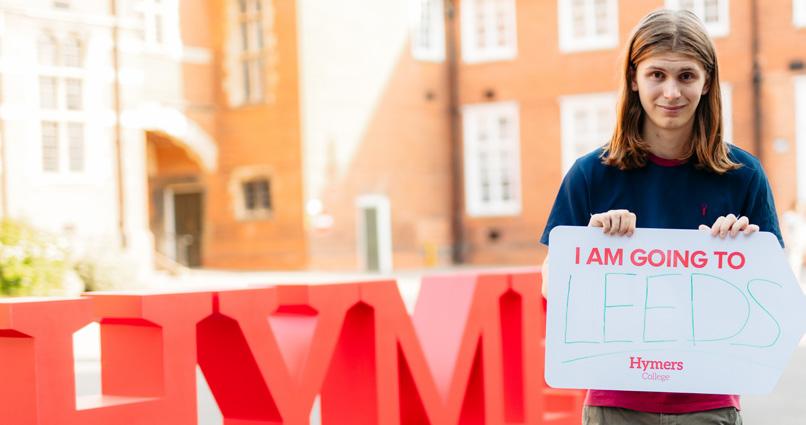
“I really cannot thank Hymers enough for the opportunities, resources and help that they gave me.”
Adam, Class of 2025 A*AB
History student at University of Leeds

Component Content
Component 1:
2 hours 30 minutes, written exam
Component 2: 2 hours 30 minutes, written exam
Component 3: 3,000-3,500 word essay
Breath study, three questions (one compulsory)
investigation Depth study, three questions (one compulsory)
Studying History at A Level opens doors to a wide range of future opportunities. The analytical, research, and critical thinking skills you develop are highly valued by universities and employers alike, making this a versatile and respected qualification. Career opportunities include:
Law | Politics | Accountancy
Journalism and Media
Civil Service and Public Administration
Teaching | Heritage or Museum Work
Research and Analysis
Studying Latin at A Level offers a unique opportunity to delve into the language and literature of ancient Rome. This course will enhance your linguistic skills through the translation and analysis of both prose and verse texts.
Beyond language proficiency, it fosters a deep understanding of Roman culture, history, and values, providing insights into the foundations of Western civilisation.
Course Content
1. Latin Language:
Master the grammar, syntax and vocabulary of Latin, through both prose and verse, developing strong translation and comprehension skills.
2. Roman History and Culture:
Explore the social, political, and cultural context
of ancient Rome to understand the world behind the texts.
3. Prose Literature:
Study selected works of Roman authors (such as Cicero, Livy, Tacitus), analysing themes, style, and historical significance.
4. Verse Literature:
Engage with the poetry of authors such as Virgil, Ovid and Catullus, examining literary techniques, imagery, and cultural meaning.
5. Literary Analysis and Critical Thinking:
Develop the ability to interpret texts, evaluate authorial choices, and compare different genres and periods.
6. Translation Skills:
Strengthen both literal and interpretive translation abilities, enabling you to engage with unseen Latin passages confidently.
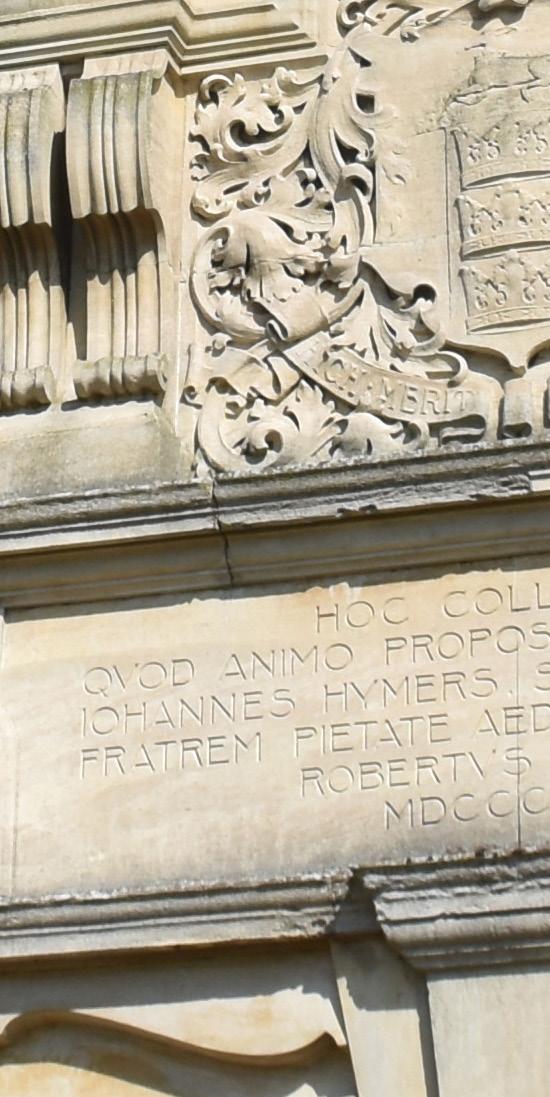
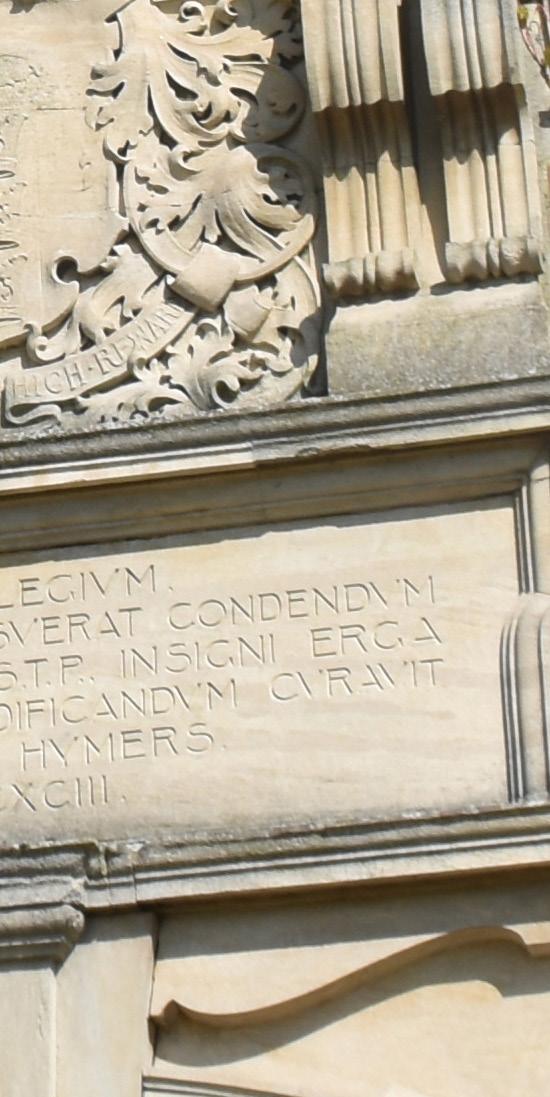
Paper
Paper 1:
1 hour 45 minutes, written exam
Paper 2:
1 hour 15 minutes, written exam
Unseen translation
Percentage of Marks
Paper 3:
2-hour written exam
Paper 4: 2-hour written exam
Prose composition or comprehension
Prose literature Verse literature
A Level Latin will equip you with analytical, linguistic, and critical thinking skills. With a justified repudiation for being intellectually rigorous, it opens doors to various career paths and further education opportunities, including:
Law
Education
Archaeology and Museum Curation
Publishing and Journalism
Translation and Linguistics
Politics and International Relations
Head of Department
Grade 7+ in GCSE Maths for A Level Mathematics
Grade 8+ at GCSE and some study beyond GCSE higher level expected for Further Maths
Edexcel
Mr E Tame - etame@hymers.org
Mathematics is a fundamental discipline that develops logical reasoning, problem-solving skills, and the ability to think abstractly. The A Level Mathematics course offers a balanced approach, combining pure mathematics with applied topics in statistics and mechanics. Further Mathematics is an extension of the A Level Mathematics course, designed for students with a keen interest in the subject. It will provide you with the opportunity to explore advanced mathematical concepts and techniques, preparing you for university-level study in mathematics and related disciplines. You would sit both A Level Mathematics and Further Mathematics at the end of Year 13; with a timetable tailored to ensure you’re ready for this.
1. Pure Mathematics:
Build strong foundations in algebra, calculus, sequences, and functions, developing your ability to reason mathematically and solve complex problems.
2. Mechanics:
Apply mathematical models to the physical world, exploring motion, forces, and energy through problem-solving.
3. Statistics:
Learn to collect, analyse, and interpret data, gaining insight into probability, distributions, and statistical inference.
4. Decision Mathematics (Further Maths only):
Tackle real-world problems using algorithms, networks, and optimisation techniques.
5. Further Pure Mathematics (Further Maths only):
Extend your understanding of advanced calculus, matrices, complex numbers, and further algebraic techniques.

Paper Content
Paper 1: 2-hour written exam
Paper 2: 2-hour written exam
Paper 3: 2-hour written exam
Paper
Paper 1: 1 hour 30 minutes, written exam
Paper 2: 1 hour 30 minutes, written exam
Paper 3: 1 hour 30 minutes, written exam
Paper 4: 1 hour 30 minutes, written exam
A Level Mathematics and Further Mathematics provide a strong foundation for university courses in mathematics, engineering, economics, and other STEM-related disciplines. You may wish to explore opportunities within:
Engineering | Economics | Physics
Computer Science
Finance and Banking
Actuarial Science | Data Science
Teaching and Academia
Statistics and Research
GCSE Music is not essential, provided the student can play a musical instrument to a Grade 7/8 standard by the end of Year 13, reads music fluently and has passed or is studying for Grade 5 theory
Eduqas
Mrs C Fong - cafong@hymers.org
Do you play a musical instrument, enjoy performing or composing, or feel curious about how music has evolved across time and cultures? If so, A Level Music could be the perfect choice for you.
Studying Music allows you to showcase creativity, discipline, and dedication — qualities highly valued by universities and employers alike. It also reflects your commitment to developing expertise over time, particularly through learning and mastering an instrument. This course will build your musical skills, deepen your knowledge and understanding, and foster a lifelong appreciation of the subject. You’ll have the chance to perform, compose, and analyse music, engaging with celebrated works as well as discovering new genres.
There are three units, and students choose to focus on either Performing or Composing.
Develop your performance skills in solo and/or ensemble work, choosing to specialise more in performing or maintaining a balanced focus with composing. You’ll perform a programme of pieces connected to the course’s areas of study, whether that’s the Western Classical Tradition or genres like Rock, Pop, Musical Theatre, Jazz, or modern classical styles.
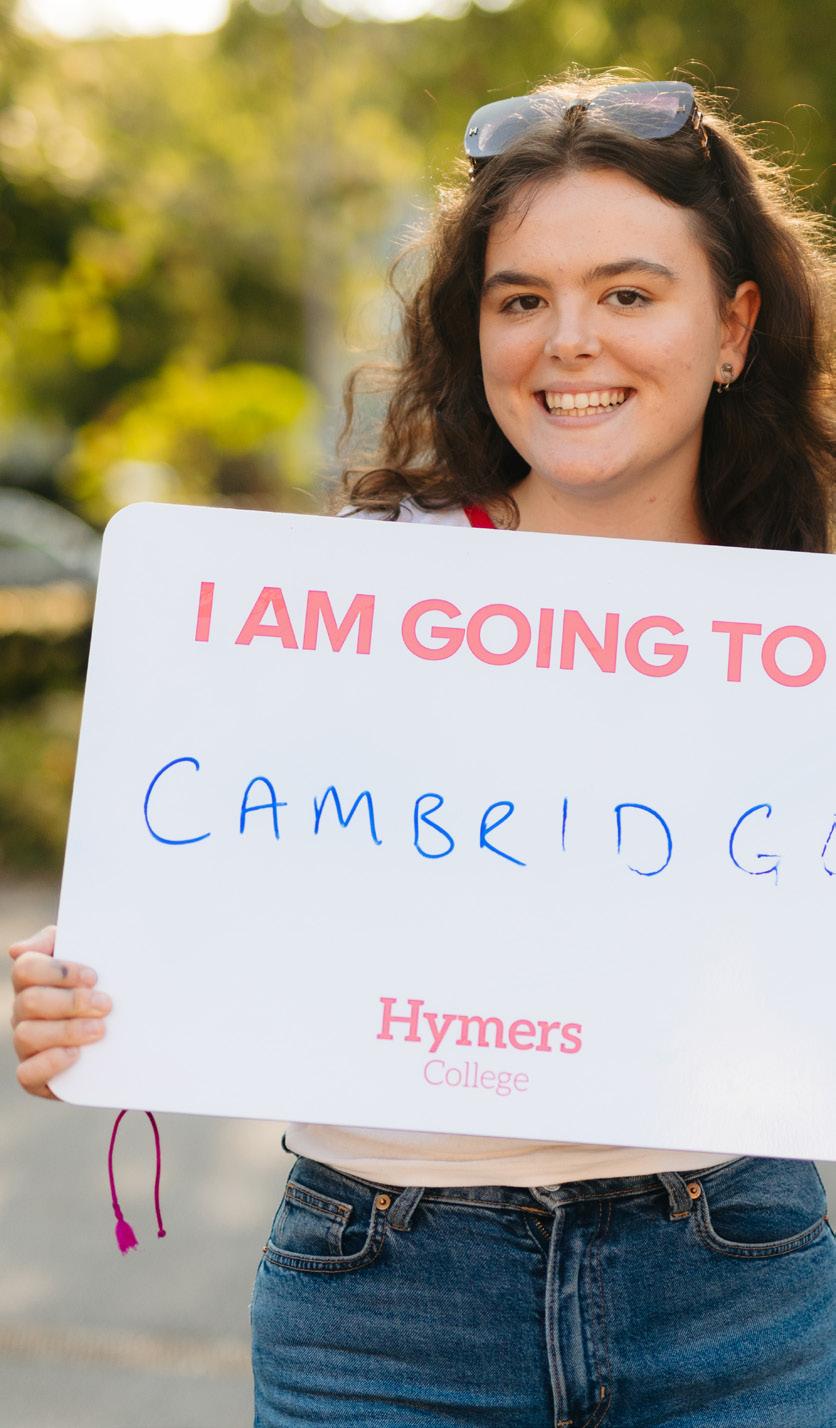
“One of my favourite things at Hymers was being involved in all of the music ensembles.
“I made loads of friends and it helped me grow in confidence, both musically and as a person.”
Melanie, Class of 2025 student at University of Cambridge

Component
Component 1:
Performing
Component 2:
Composing
Component 3:
Appraising
10-12 minute performance, consisting of a minimum of three pieces
A composition portfolio of 4-6 minutes, consisting of two compositions
6-8 minute performance, consisting of a minimum of two pieces
A composition portfolio of 8-10 minutes, consisting of three compositions
Written exam lasting 2 hours 15 minutes
2. Composing (Component 2):
Build your creativity by composing two or three original pieces — one in the Western Classical Tradition, another linked to your chosen area of study, plus an additional free composition if you opt to specialise more heavily in composing.
3. Appraising (Component 3 – Listening):
Enhance your analytical skills by studying how music works in context. You’ll examine and compare set works from both classical and contemporary genres — ranging from symphonies to jazz and modern compositions — and respond to unseen musical extracts in exam conditions.
In addition to developing your musical skills to a high level, this course also builds valuable transferable skills such as communication, leadership, teamwork, negotiation, and decision-making. These qualities are highly sought after in many industries and will serve you well, whatever path you choose.
You may wish to explore a career as a:
Musician | Composer | Producer
Sound Engineer | Music Journalist
Music Teacher | Music Therapist
Stage Manager | Events Manager
Arts Administrator | Broadcast Assistant
GCSE Religious Studies is not required; all that is needed is an inquisitive mind and a willingness to communicate ideas and opinions
OCR
Mr G Hambleton - grhambleton@hymers.org
Studying religion and philosophy is a journey through the full scope of human existence: exploring our origins, our destination, and everything that shapes our lives in between. The course will challenge you to look beyond surface-level assumptions, encouraging deep debate and discussion on the issues that affect us all. You’ll investigate the influential ideas of thinkers such as Plato, Socrates, and Aristotle, and tackle ethical dilemmas including how to live a meaningful life, the nature of our rights and responsibilities, and the language of morality.
If you enjoy questioning accepted ideas, engaging in thought-provoking debates, and examining why people hold particular beliefs, then this course could be a perfect fit for you.
1. Philosophy of Religion:
Explore the big questions about existence, knowledge, and belief. You’ll study ancient philosophical influences, the nature of the soul, mind, and body, and arguments for and against the existence of God. You’ll consider the significance of religious experience, the challenge of evil for faith, ideas about the nature of God, and debates around religious language.
2. Religion and Ethics:
Examine how ethical ideas shape human life and decision-making. You’ll investigate normative ethical theories and apply them to contemporary issues, explore ethical language and thought, debates about the role of conscience, and sexual ethics, considering how religious beliefs influence moral perspectives.
Delve into how religious beliefs, values, and teachings have evolved over time and across cultures. You’ll look at sources of wisdom and authority, practices that express religious identity, and the social and historical developments that have shaped theology. You’ll also explore key themes in the relationship between religion and society, focusing on Christianity.

Studying Philosophy, Religion and Ethics will help you develop a critical and reflective mindset, gain a deeper understanding of how religious thought shapes individuals and societies, and connect these ideas to broader global contexts. You’ll cultivate analytical and ethical reasoning skills, refine your own values and perspectives, and build knowledge that is highly relevant for both further study and professional life. This qualification can open doors to a wide range of careers, including:
Social
Journalism
Business
Medicine
Human
Publishing
Marketing
Entry Requirements
Grade 7+ in GCSE PE and/or GCSE Biology
You must also be playing at least one sport to a high level for school, club or county
Exam Board
Head of Department
OCR
Mrs W Johnston - wrjohnston@hymers.org
Do you enjoy sport and want to understand the science, psychology, and culture behind it?
A Level Physical Education offers the chance to explore physical activity from multiple perspectives, combining practical performance with academic study.
You’ll investigate topics such as anatomy and physiology, sports psychology, and the history and development of sport, while also tackling current issues shaping the sporting world today. Alongside this, you’ll have the opportunity to perform or coach in your chosen sport, applying your learning directly to real situations.
1. Physiological Factors affecting Performance:
Explore how the body’s key systems respond to exercise and diet, while also examining the effects of force and motion through applied anatomy and physiology, exercise physiology, and biomechanics.
2. Psychological Factors Affecting Performance:
Investigate how we learn and develop sporting skills, the role of feedback and training, and the impact of psychological influences such as group dynamics, leadership, and stress.

3. Socio-Cultural Issues in Physical Activity and Sport:
Consider how sport has been shaped by society and culture, the global impact of major events like the Olympic Games, and the role of technology in transforming modern sport for athletes and spectators.
4. Practical Performance: Take on the role of either performer or coach in your chosen sport, demonstrating effective skills, tactics, and understanding of the rules under real conditions.
5. Evaluating and Analysing Performance for Improvement (EAPI): Assess a peer’s live or recorded performance, providing oral analysis and critical evaluation to identify strengths and areas for development.
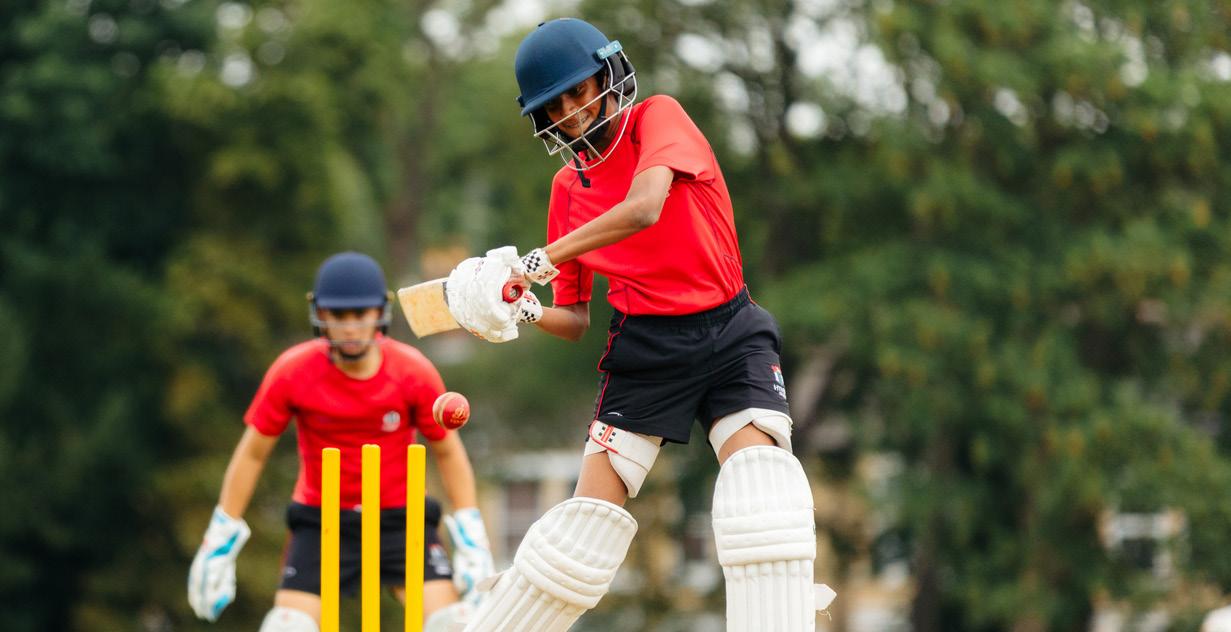
Assessment
Component Content
Component 1: 2-hour written exam
Physiological factors affecting performance
Percentage of Marks
An A Level in Physical Education opens doors to a wide range of careers in sport, health, and fitness, as well as providing transferable skills such as teamwork, leadership, communication, and analytical thinking that are valued across many professions.
Whether you are passionate about helping others reach their full potential, supporting physical rehabilitation, or pursuing performance at the highest level, PE equips you with the knowledge and skills to move forward confidently. Potential career pathways include:
PE Teacher
Sports Coach
Component 2: 1-hour written exam
Component 3: 1-hour written exam
Component 5: Non-exam assessment
Component 6: Non-exam assessment
Socio-cultural issues in physical activity and sport
Practical performance
Evaluating and analysing performance for improvement (EAPI) Psychological
Personal Trainer
Sports Development Officer
Sports Therapist | Physiotherapist
Fitness Instructor/Manager
Sports Scientist | Athlete
Outdoor Activities Instructor
Sports Journalist
Commentator
Entry Requirements
Exam Board
Head of Department
Grade 7+ in GCSE Physics or GCSE Science - Double Award, and grade 7+ in GCSE Maths is strongly advised AQA
Mr B Young - bjyoung@hymers.org
Are you curious about the boundaries of space, the origins of time, and everything that exists in between? Physics offers a captivating and intellectually rewarding journey for anyone eager to understand the world around them. As one of the most fundamental natural sciences, Physics seeks to explain the behaviour of everything from the tiniest particles to the vastness of the universe. By studying Physics, you will develop strong analytical, quantitative and problem-solving abilities. As the course advances, you will also gain hands-on practical skills that complement your theoretical knowledge.
1. Measurements and their Errors: Learn about SI units and prefixes, limitations of measurements, and estimation of physical quantities.
2. Particles and Radiation: Explore atomic structure, stable and unstable nuclei, particles and antiparticles, conservation laws, the photoelectric effect, electron collisions, energy levels, and wave-particle duality.
3. Waves: Study progressive, longitudinal and transverse waves, superposition, stationary waves, interference, diffraction, and refraction.
4. Mechanics and Materials: Understand scalars and vectors, motion, Newton’s laws, momentum, energy, work, power, conservation of energy, and bulk properties of solids, including Young’s modulus.
5. Electricity: Current-voltage characteristics, resistivity, circuits, potential dividers, electromotive force, and internal resistance.
6. Further Mechanics and Thermal Physics: Examine circular and simple harmonic motion, forced vibrations, thermal energy transfer, ideal gases, and molecular kinetic theory.
7. Fields and Their Consequences: Study gravitational and electric fields, Newton’s law, Coulomb’s law, capacitance, magnetic fields, electromagnetic induction, alternating currents, and transformers.
8. Nuclear Physics: Explore radioactive decay, nuclear instability, nuclear radius, mass-energy equivalence, induced fission, and safety aspects.
9. Turning Points in Physics: Review key discoveries including cathode rays, electron charge, corpuscular theory, Young’s experiment, electromagnetic waves, photoelectric effect, wave-particle duality, electron microscopes, Michelson-Morley experiment, and special relativity.

Paper Content
Paper 1: 2-hour written exam
Paper 2: 2-hour written exam
Sections 1 to 5 and 6.1
Paper 3: 2-hour written exam
Sections 6.2, 7 and 8, assumed knowledge from sections 1 to 6.1
Practical skills and data analysis, and turning points in Physics
Physics provides a strong foundation for diverse career paths in science, technology, engineering, and beyond.
Possible career paths include:
Aerospace | Biotechnology
The Civil Service
The Coal, Gas or Oil Industries
Consultancy
Electronics | Engineering
Radiography | Research | Telecommunications
There are no specific entry requirements
Dr J Denton - jdenton@hymers.org
A Level Politics offers a fascinating insight into how power, governments, and societies operate. You’ll explore political ideologies, the workings of the UK and global political systems, and the impact of policy on everyday life. The course sharpens your analytical thinking, debate skills, and ability to construct well-reasoned arguments — qualities highly valued by universities and employers alike. Politics pairs particularly well with subjects that develop critical thinking and an understanding of society, such as History, Economics, Business, Philosophy Religion and Ethics, and the Sciences, helping you build a broad and balanced skill set.
1. Political Participation:
Explore how democracy works, how people engage in politics, and the influence of political parties, voting systems, the media, and public opinion.
2. Core Political Ideas:
Investigate the foundational political ideologies of Conservatism, Liberalism, and Socialism, and how they shape societies and policies.
3. UK Government:
Understand the structure and functions of the UK government, including the constitution, parliament, the Prime Minister and executive, and the relationships between different branches of power.
4. Politics of the USA:
Examine the US political system, including the Constitution, federalism, Congress, the presidency, the Supreme Court, and key issues like democracy, participation, and civil rights.
5. Optional Political Ideas:
Study additional ideologies such as anarchism, ecologism, feminism, multiculturalism, or nationalism, allowing you to explore diverse perspectives and contemporary debates.

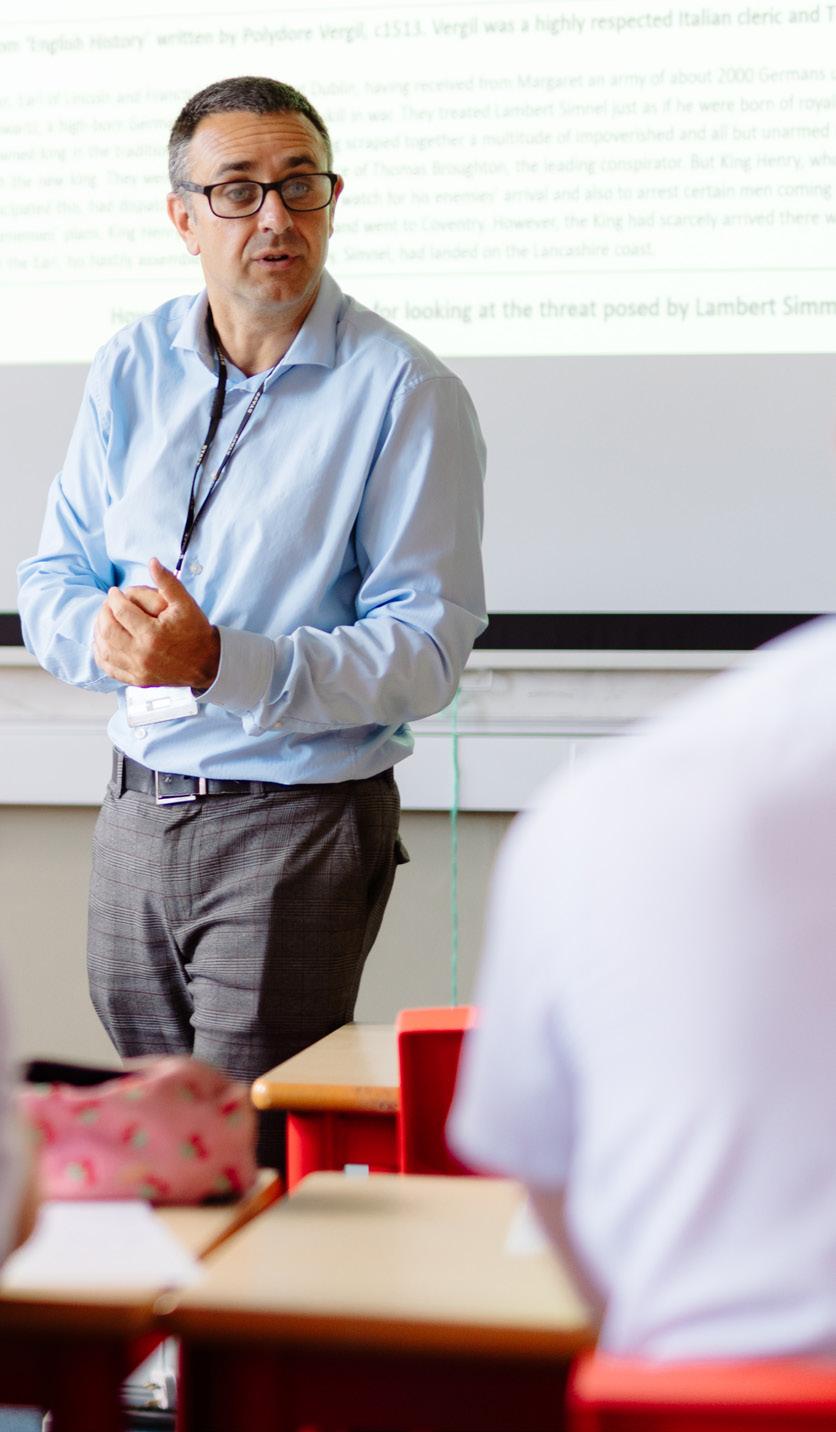
Politics will help to inform and support your understanding of what has happened in the past, understand motivation and help form arguments.
Studying Politics develops analytical thinking, independent judgment, and a clear understanding of how governments and societies function. These skills are highly valued across a wide range of careers, not just in politics, including: Law
Business and Management
Human Resources
Civil Service and Public Administration
Journalism and Media
Armed Forces
International Relations and Diplomacy
Education and Teaching
Entry Requirements
Exam Board
Head of Department
Grade 6+ in GCSE Maths and English AQA
Mrs Rochelle Mills - rmills@hymers.org
Psychology is a broad, captivating, and constantly evolving subject that offers insight into nearly every aspect of our daily lives. It helps us make sense of the world around us and understand – and even predict – human behaviour.
As a dynamic and ever-advancing science, Psychology seeks to answer fundamental questions about why people think, feel, and act the way they do, and how they can be supported in managing their behaviour.
1. Social Influence:
Understand how individuals are affected by groups, authority, and social norms, as well as why people conform or obey.
2. Memory:
Explore how memory works, why we forget, and the reliability of eyewitness testimony.
3. Attachment:
Study the bond between infants and caregivers, and how early attachments can influence later development.
4. Clinical Issues and Mental Health:
Examine psychological disorders such as phobias, depression and OCD, and the approaches used to treat them.
5. Approaches in Psychology:
Learn about the different schools of thought in psychology, from behaviourism to cognitive and biological approaches.
6. Biopsychology:
Investigate how the brain, nervous system and hormones affect behaviour.
7. Research Methods:
Gain essential skills in conducting and evaluating psychological research, using both qualitative and quantitative methods.
8. Issues and Debates in Psychology:
Develop a critical understanding of the big questions in psychology, such as nature versus nurture and free will versus determinism.

As a collective, you and your class will also choose from the following optional modules:
Option 1: Relationships, Gender, Cognition and Development
Option 2: Schizophrenia, Eating Behaviour, Stress
Option 3: Aggression, Forensic Psychology, Addiction
Paper 1: 2-hour written exam Paper 3: 2-hour written exam Paper 2: 2-hour written exam
Studying Psychology develops a wide range of valuable skills, including investigative and analytical thinking, mathematical and statistical abilities, essay writing, ethical reasoning, and effective problem-solving. It also complements a variety of other disciplines such as Human Biology, Law, Sociology, History, Philosophy and Ethics, opening the door to diverse career paths. Potential careers include:
Psychologist: Clinical, Educational, Forensic, Health, Occupational, Sport and Exercise or Neuro
Counselling | Research | Academia or Teaching
Human Resources | Marketing and Advertising
Social Work | Criminology | Law | Healthcare
Market Research | Sales and Management
Requirements
Board
of Department
Grade 5+ in GCSE English and one humanities-based subject, such as History or Religious Studies
Mrs R Mills - rmills@hymers.org
Ever wondered why people behave the way they do, how memories are formed, or what influences our decision-making? A Level Sociology gives you the tools to explore these questions and more.
You’ll investigate the science behind human thought and behaviour, gain insight into yourself and others, and develop skills in research, analysis and critical thinking — abilities that are highly valued in both further study and the workplace.
1. Education:
Examine the role and functions of the education system and how it impacts social class, gender and ethnicity.
2. Culture and Identity:
Explore how individuals are socialised into society and how this shapes personal and group identities.
3. Media and Society:
Investigate the selection and presentation of news, and the influence of media on public perception and social behaviour.
4. Crime and Deviance:
Study the causes of crime, methods of social control, and the role and effectiveness of the criminal justice system.
5. Theories and Research Methods:
Develop an understanding of key sociological theories and learn how to apply research methods to study society.
Percentage of Marks Assessment
Paper Content
Paper 1:
2-hour written exam
Paper 2:
2-hour written exam
Education with theory and methods
and identity and media
Paper 3:
2-hour written exam
Crime and deviance with theory and methods
Studying Sociology will equip you with a strong understanding of social structures, human behaviour, and societal issues, alongside critical thinking, research, and communication skills.
These are highly valued by employers and universities alike, opening doors to careers where insight into people and society is essential. For instance:
Law and the Criminal Justice System
Police and Probation Services
Local or Central Government
Charity and Research Organisations
Counselling | Education
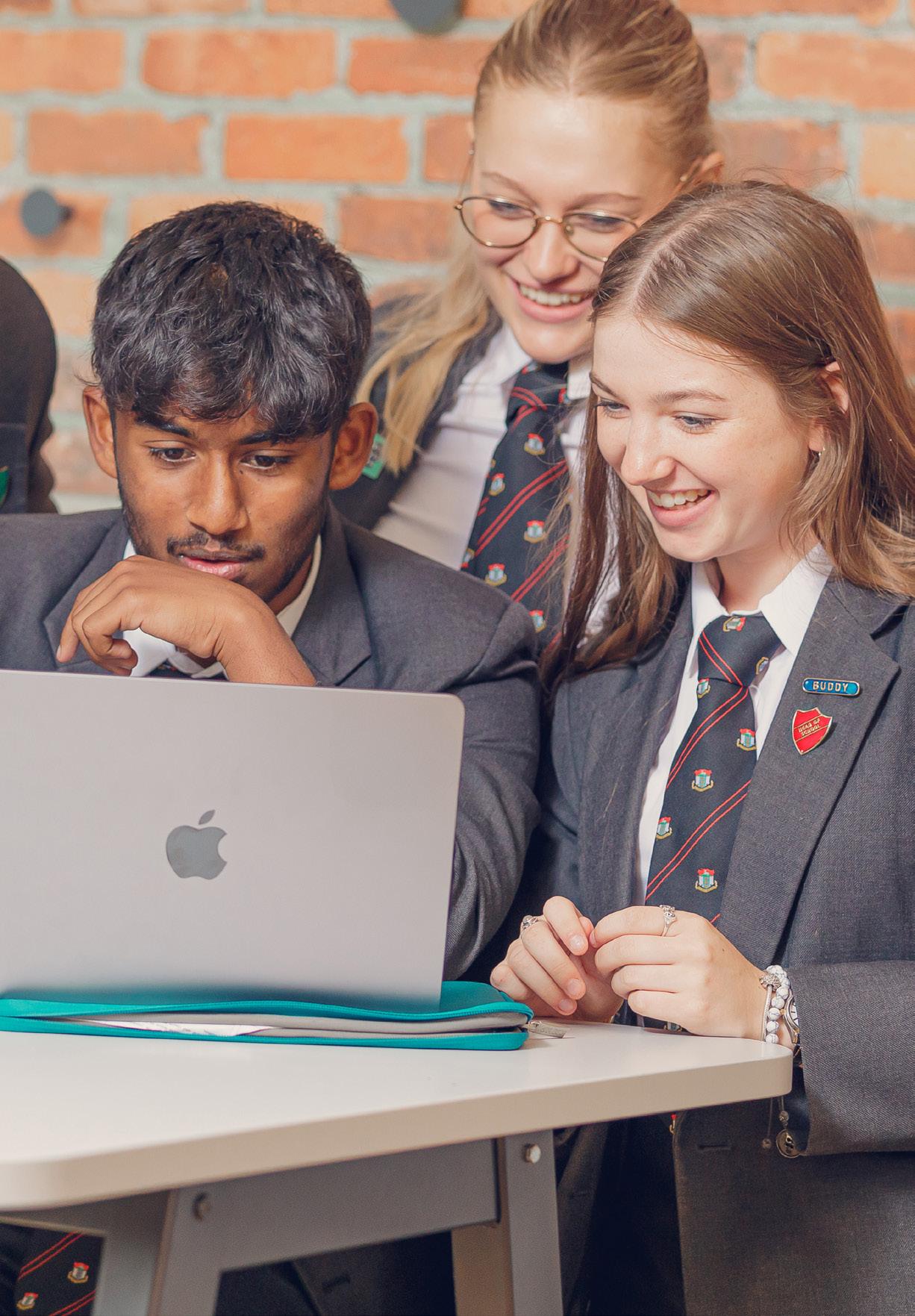
Grade 6+ GCSE Spanish
Mr A Sanz Caro - ajsanzcaro@hymers.org
Mastering a second language opens doors to new cultures, ideas and opportunities. As one of the widest spoken languages globally, Spanish is a powerful choice for anyone looking to expand their personal and professional horizons.
Learning Spanish opens up a wide range of personal, academic, and professional opportunities. You will engage deeply with the culture, history, and societies of the Spanish-speaking world. You’ll develop essential skills in listening, speaking, reading, writing, and translation, while also learning to critically analyse literature, film and media in Spanish. This course encourages independent thinking, cultural awareness and confident communication — skills that are valuable in almost any career path.
1. The Evolution of Spanish Society:
Explore changing family life, gender equality in the workplace, and the impact of tourism on Spain’s economy and environment.
2. Political and Artistic Culture:
Study the influence of music, media and festivals on Spanish-speaking cultures.
3. Immigration and Multiculturalism:
Examine the contributions of immigrants, the challenges of integration, and social and political reactions to immigration.
4. Franco and the Transition to Democracy:
Investigate the Spanish Civil War, life under Franco’s dictatorship, and the transition to democracy in the late 20th century.


Component Content
Component 1:
Listening and 2-hour written exam
Component 2: 2 hours 40 minutes, written exam
Component 3: Speaking
response to written works and translation
Listening, reading and translation A 15-minute conversation between teacher and student
Studying A Level Spanish opens doors to a wide range of careers, particularly those where strong communication skills, cultural awareness, and multilingual abilities are highly valued. The skills you develop in analysis, research, and cross-cultural understanding are transferable to many industries.
Potential careers include:
Language teaching | Translation and interpreting
Linguistics | International business and marketing
Tourism and hospitality
Diplomacy and international relations
Publishing and media | Law and legal services
Finance and banking
BTEC Level 3 Diploma, Extended Certificate or Foundation Certificate
Entry Requirements
GCSE PE is not required
Grade 4+ in all three GCSE Sciences, with preferably 6+ in Biology or 5-5 in GCSE Combined Science
Exam Board
Head of Department
Edexcel
Mr J Windeatt - jwwindeatt@hymers.org
If you are passionate about sport and fitness, this course offers an exciting way to develop practical skills and academic knowledge. You can choose to study the Diploma, equivalent to two A Levels, or the Extended Certificate, equivalent to one A Level. If you take the Extended Certificate, you also have the option to complete extra units to achieve a Foundation Certificate, worth an additional half A Level.
This course is perfect for students who enjoy hands-on learning, teamwork, and leadership.
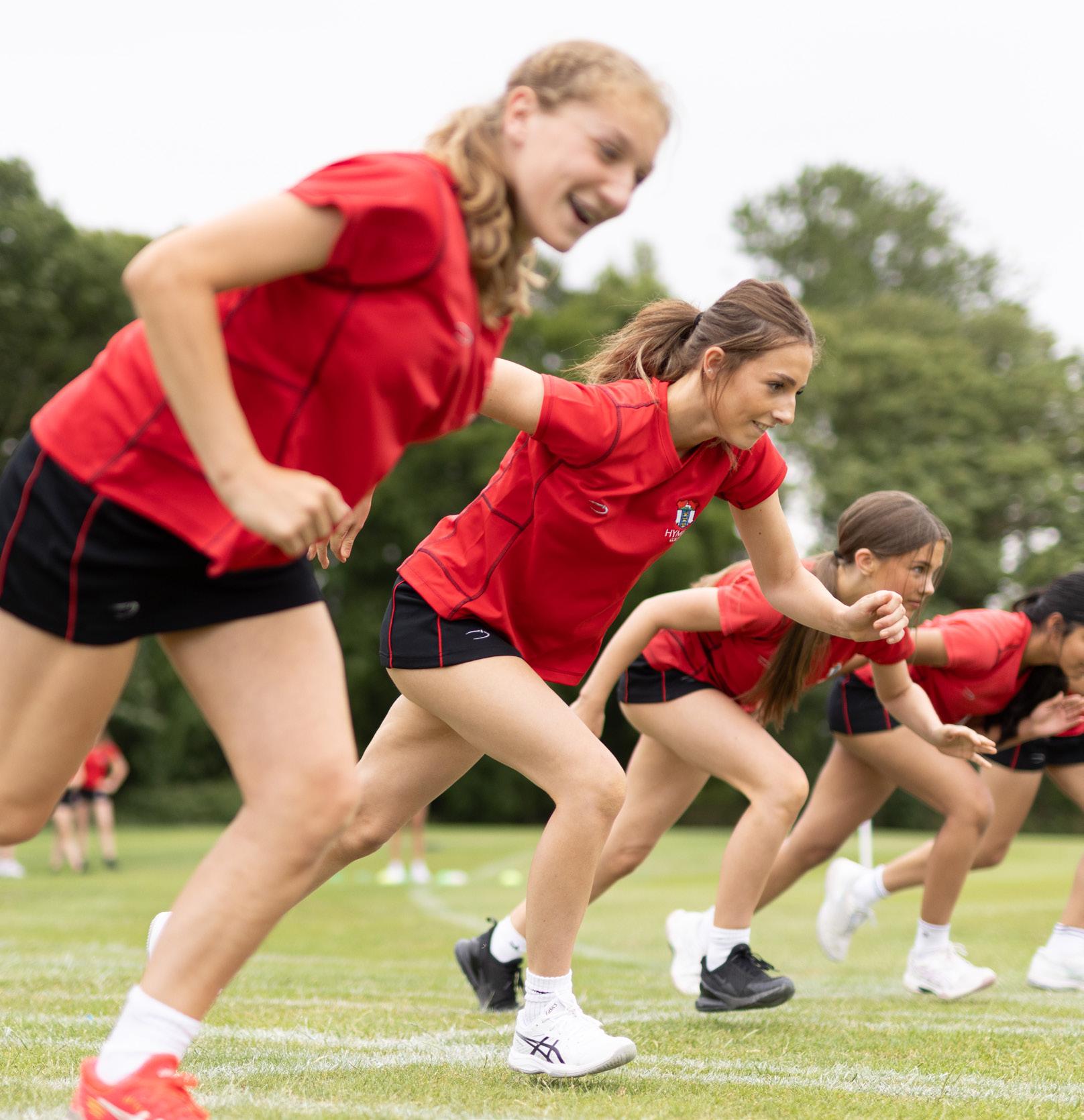

1. Health, Wellbeing and Sport:
Understand how physical activity and lifestyle choices impact health.
2. Sports Leadership:
Develop the skills to lead, motivate, and manage teams effectively.
3. Professional Development in the Sports Industry:
Explore career pathways and professional practices.
4. Skill Acquisition in Sport:
Examine how athletes learn and refine techniques.
5. Investigating Business in Sport and the Active Leisure Industry:
Study the commercial and organisational aspects of sport.
6. Application of Fitness Testing:
Learn to assess and interpret physical performance data.
7. Practical Sports Performance:
Apply skills and tactics in real-world sporting contexts.
A continual assessment model is used, meaning that you will be assessed as the learning has taken place throughout the course. This will be through a combination of external exams, controlled assessment, written coursework and practical coursework.
There will also be three external assessments, covering:
• Anatomy and Physiology
• Fitness Training and Programming for Health, Sport and Wellbeing
• Investigating Business in Sport and the Active Leisure Industry
All other units are assessed internally through controlled assessment.
BTEC qualifications are accepted by many universities worldwide, including some Russell Group universities, as A Level equivalents. Employers and universities are looking for people who have a thorough grounding in the latest industry requirements and real-world skills that you will be able to demonstrate as a BTEC learner.
Whether you want to work in sports or combine your love of sport with management or science, this course gives you the foundation to succeed. Career opportunities include:
PE Teacher | Sports Coach | Personal Trainer
Sports Development Officer | Sports Therapist
Physiotherapist | Fitness Instructor/Manager
Sports Scientist | Athlete
Outdoor Activities Instructor | Public Services
11 students left Hymers to study Medicine, Dentistry or Veterinary Science at university
6 students secured places at the Universities of Oxford and Cambridge